The document discusses how changes to Java libraries can affect compatibility with client programs. It explores how modifying interfaces, method signatures, static vs non-static methods, and other changes impact both binary and source compatibility. A series of examples are provided where a library evolves from version 1.0 to 2.0. For each change, it analyzes whether the client program will still compile and run correctly.
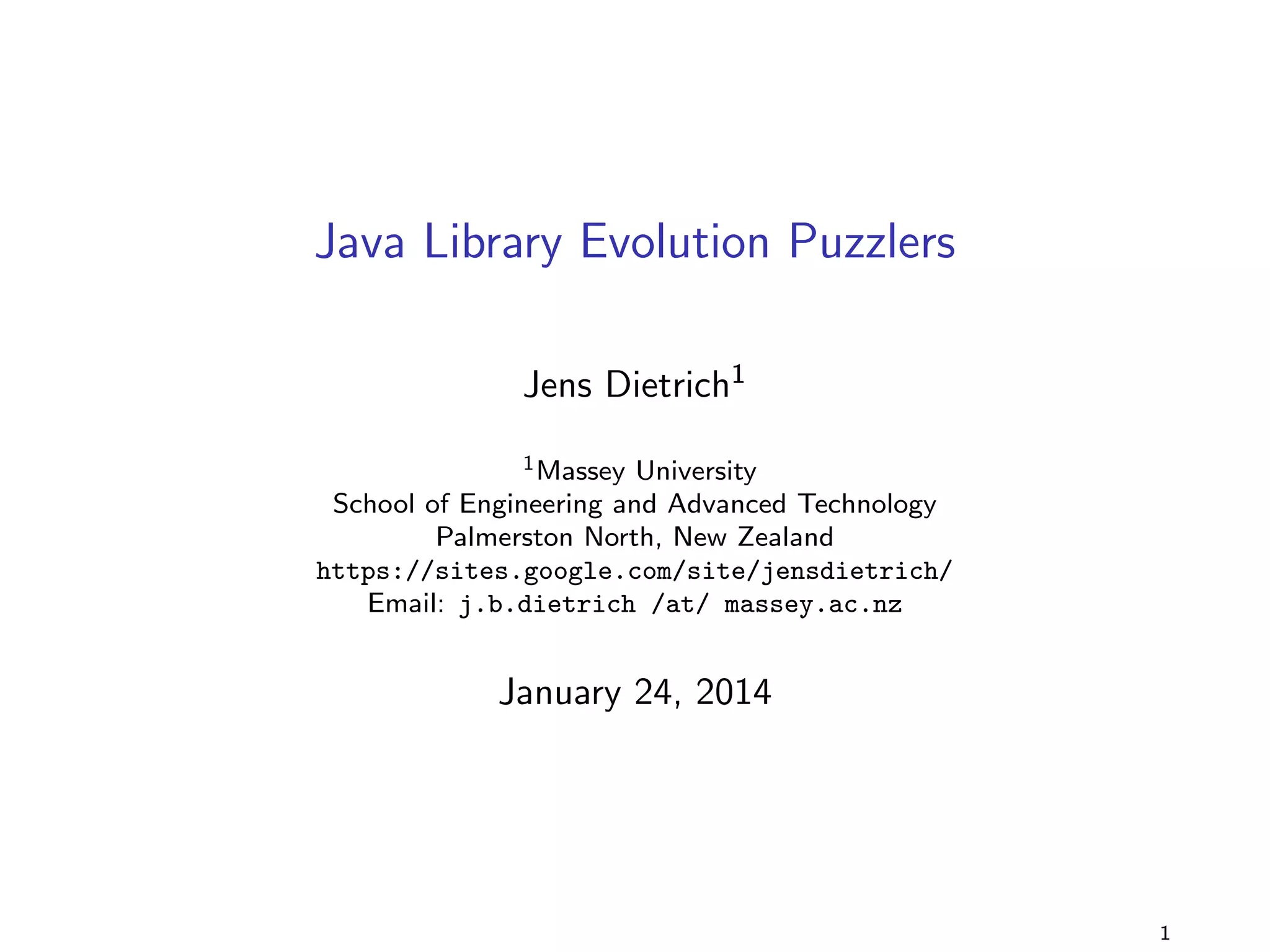
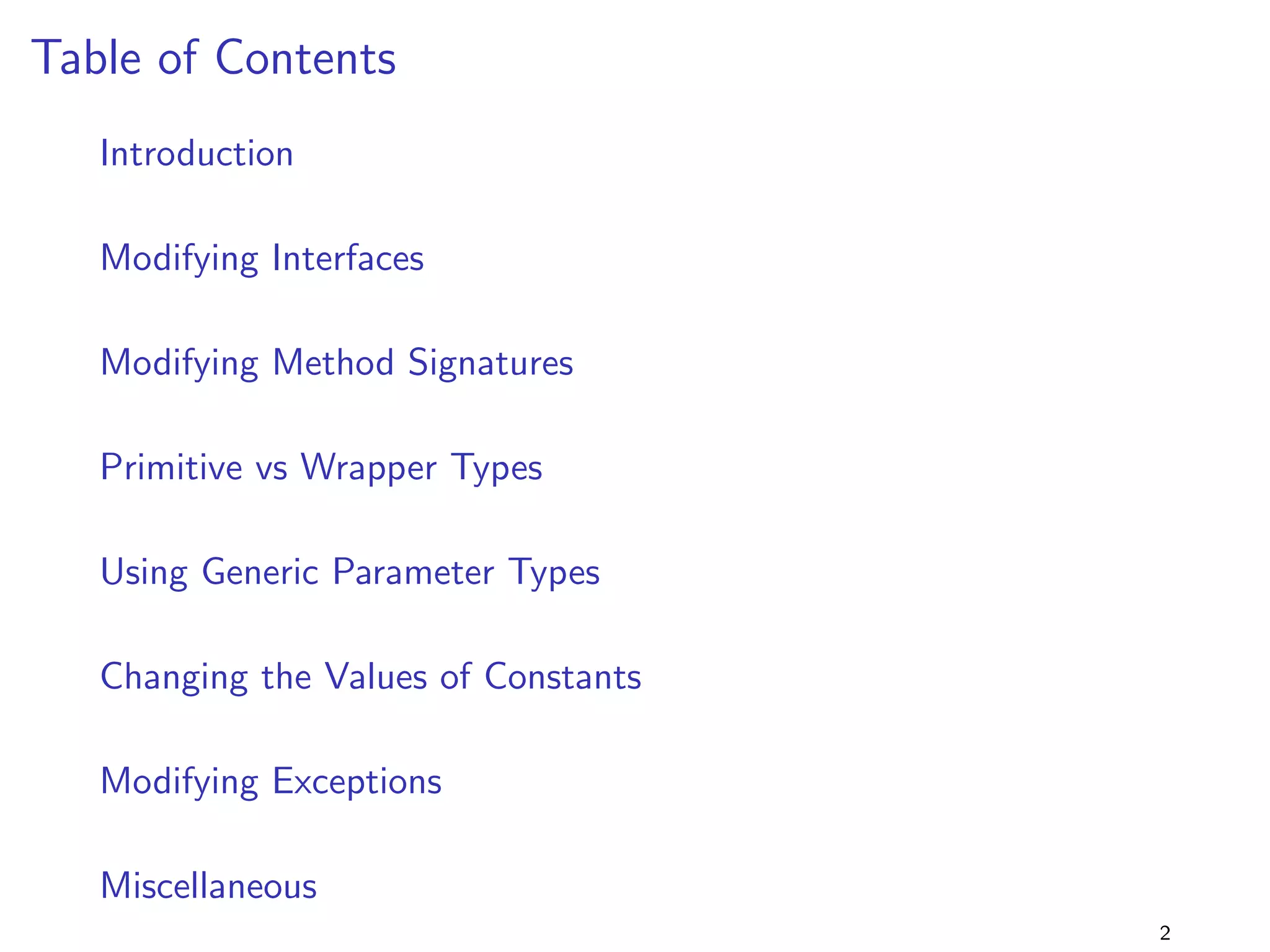
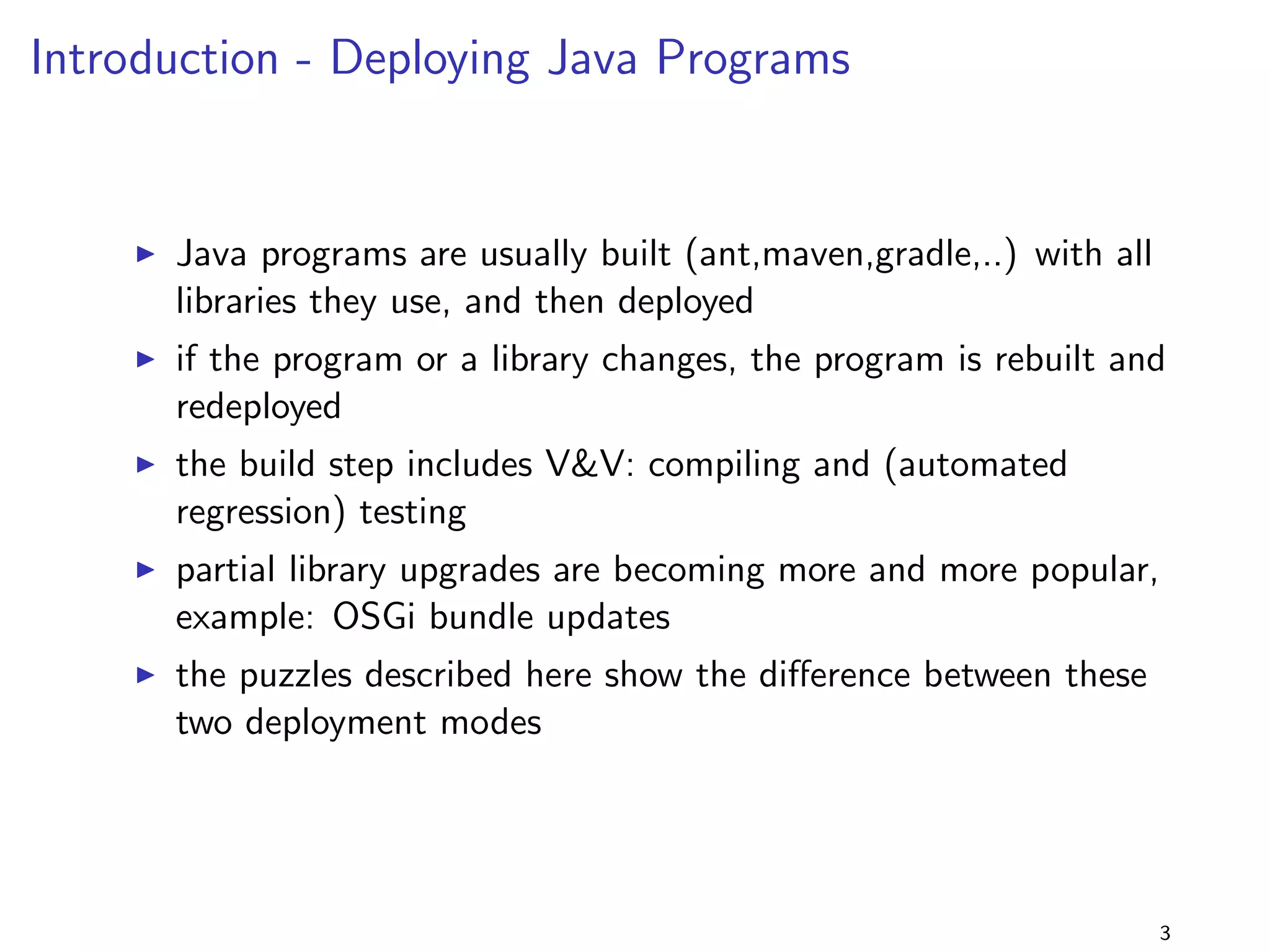
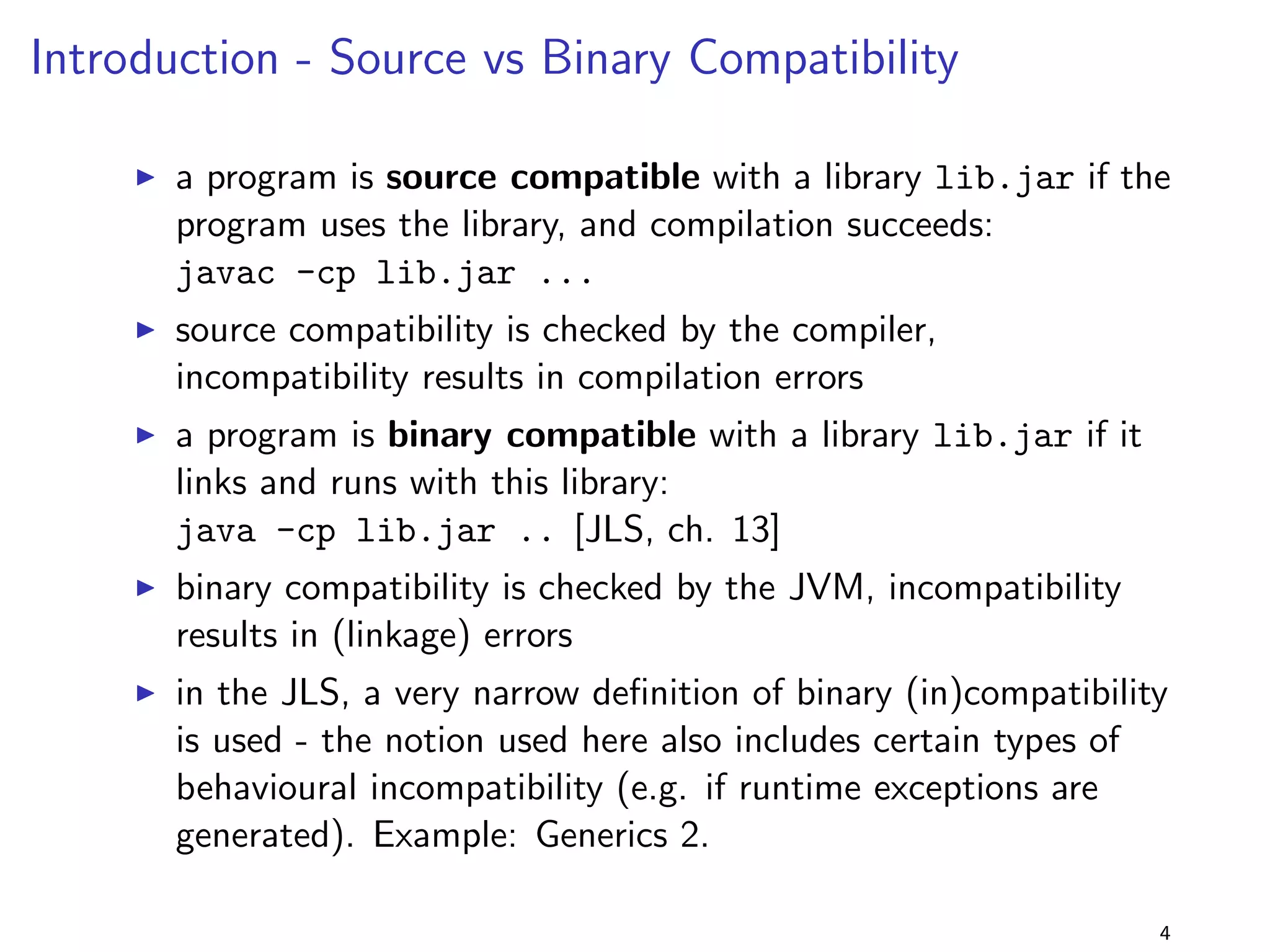
![Introduction - Source vs Binary Compatibility
I a program is source compatible with a library lib.jar if the
program uses the library, and compilation succeeds:
javac -cp ..,lib.jar,.. ...
I source compatibility is checked by the compiler,
incompatibility results in compilation errors
I a program is binary compatible with a library lib.jar if it
links and runs with this library:
java -cp ..,lib.jar,.. .. [JLS, ch. 13]
I binary compatibility is checked by the JVM, incompatibility
results in (linkage) errors
5](https://image.slidesharecdn.com/presentation-140123192247-phpapp02/75/Java-Library-Evolution-Puzzlers-5-2048.jpg)
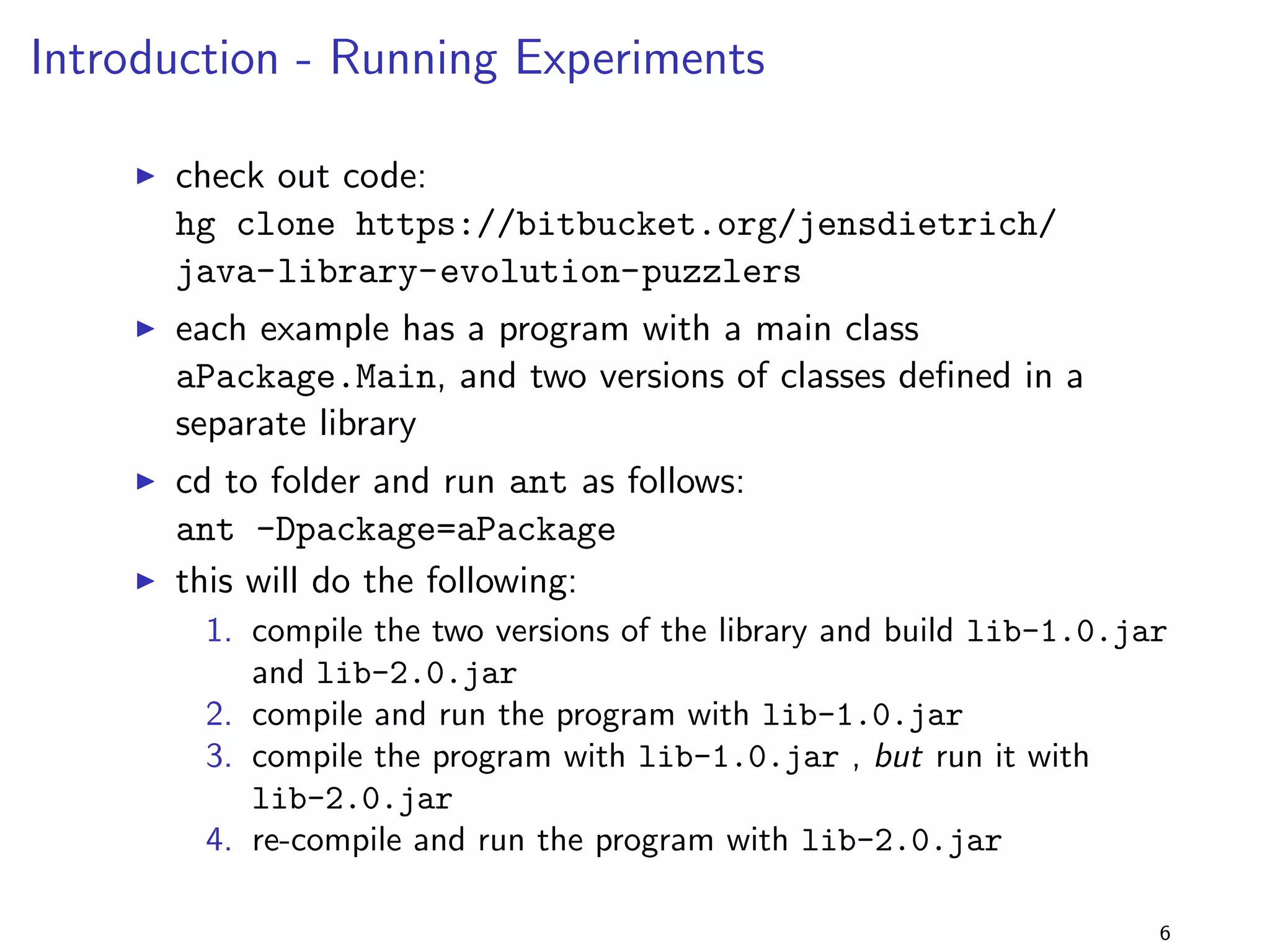
![nition of binary (in)compatibility
is used: A change to a type is binary compatible with
pre-existing binaries if pre-existing binaries that previously
linked without error will continue to link without error.
[JLS, ch. 13.2]
I binary compatibility is de](https://image.slidesharecdn.com/presentation-140123192247-phpapp02/75/Java-Library-Evolution-Puzzlers-7-2048.jpg)
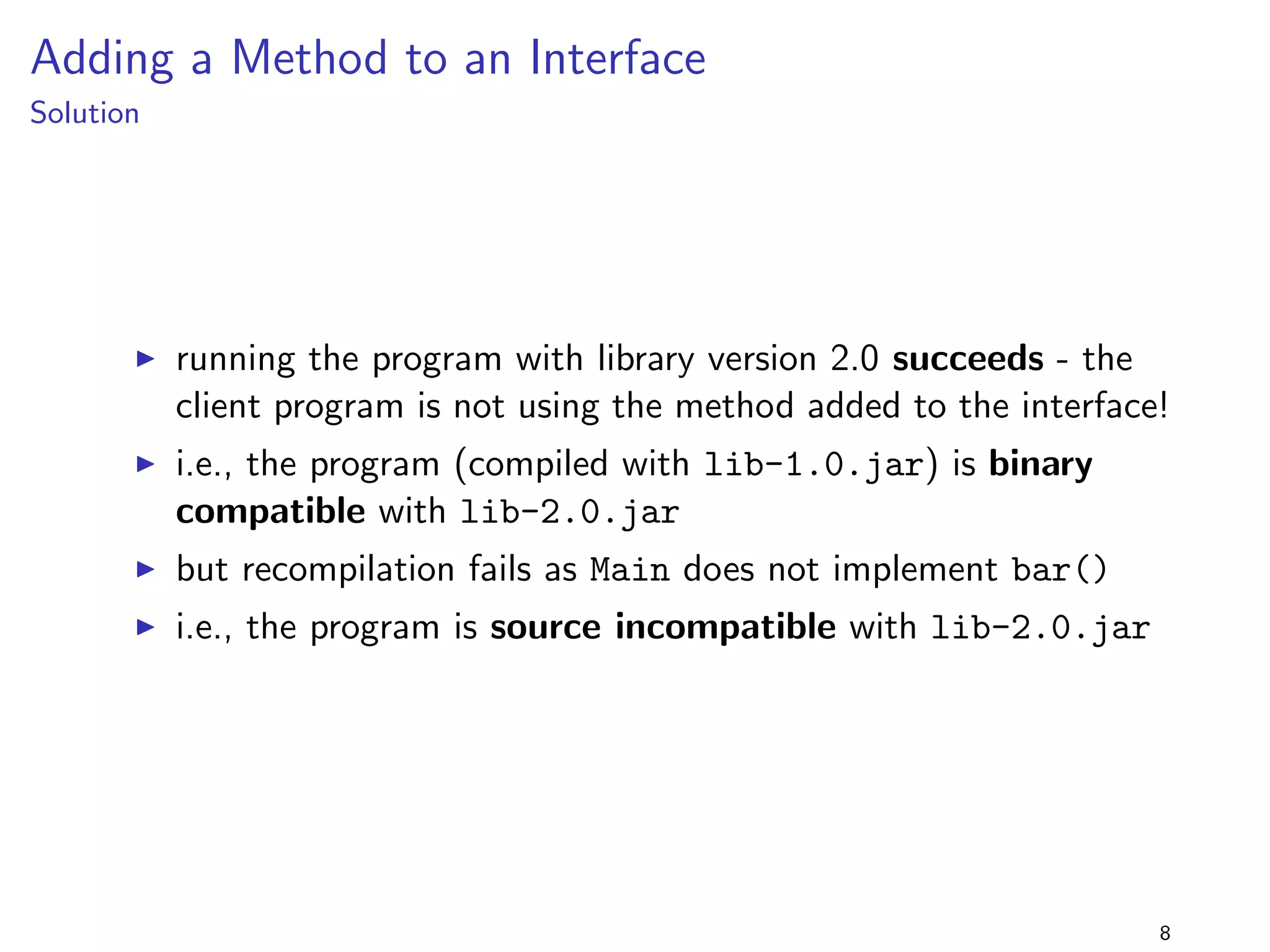
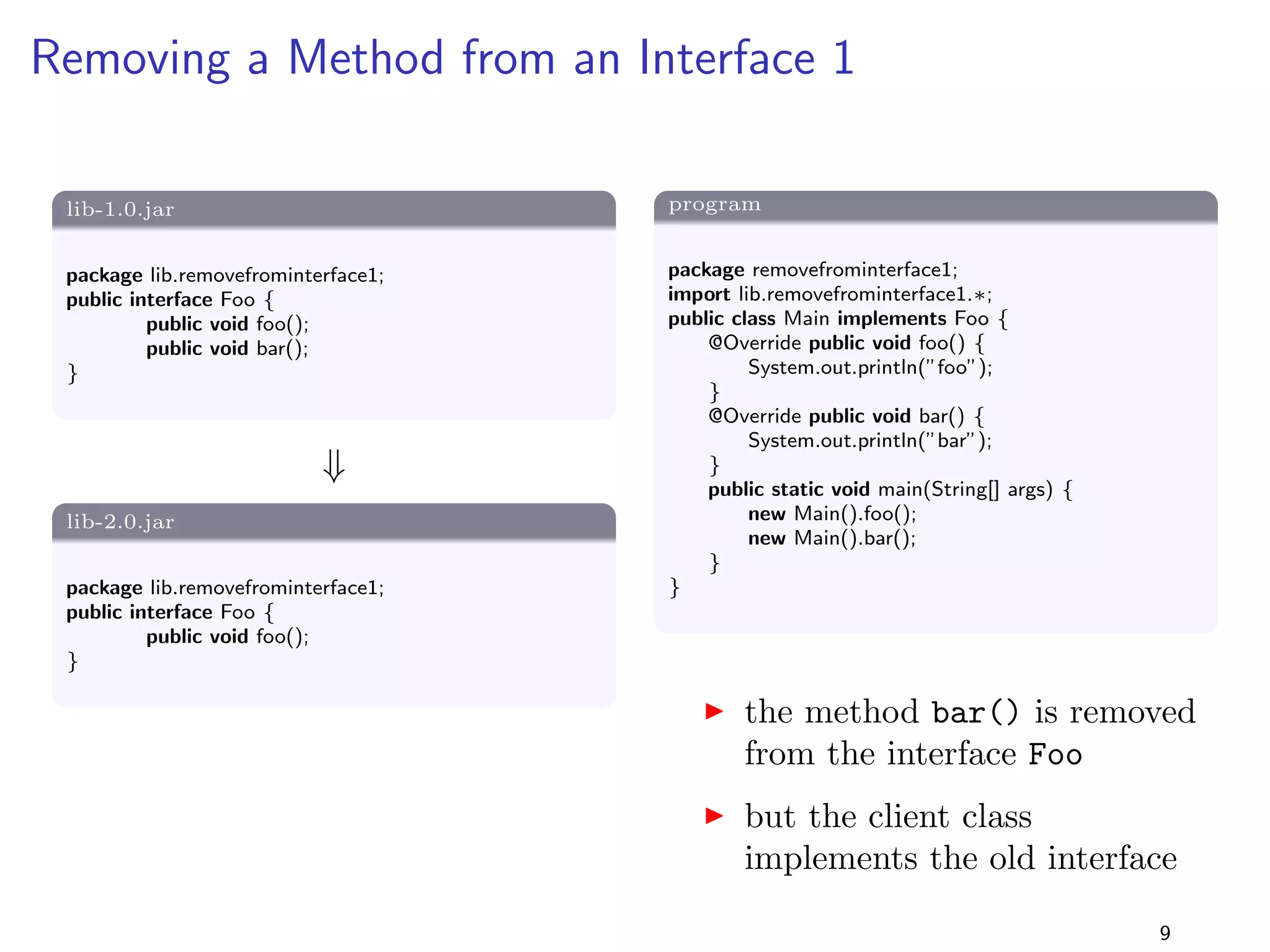
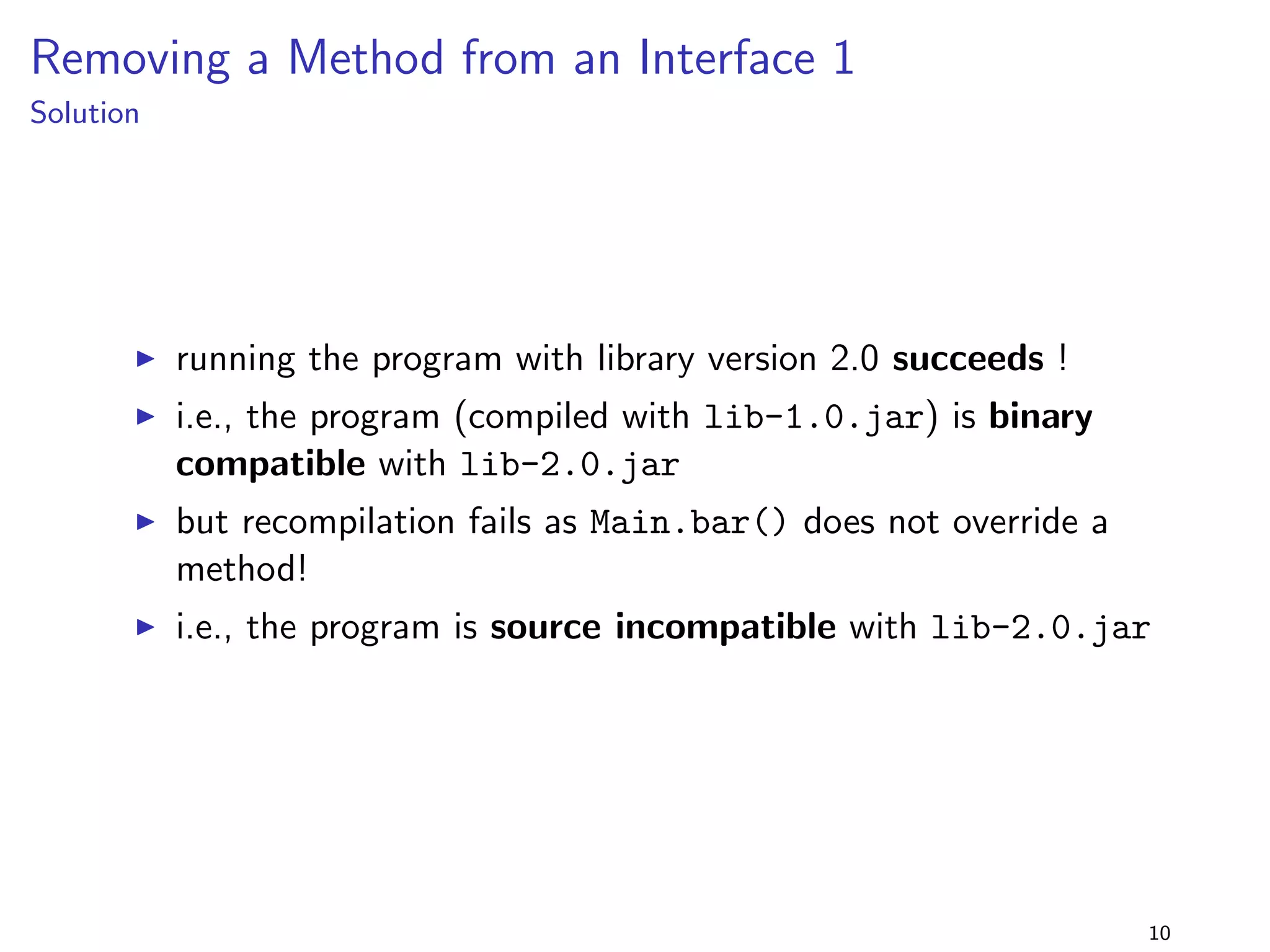
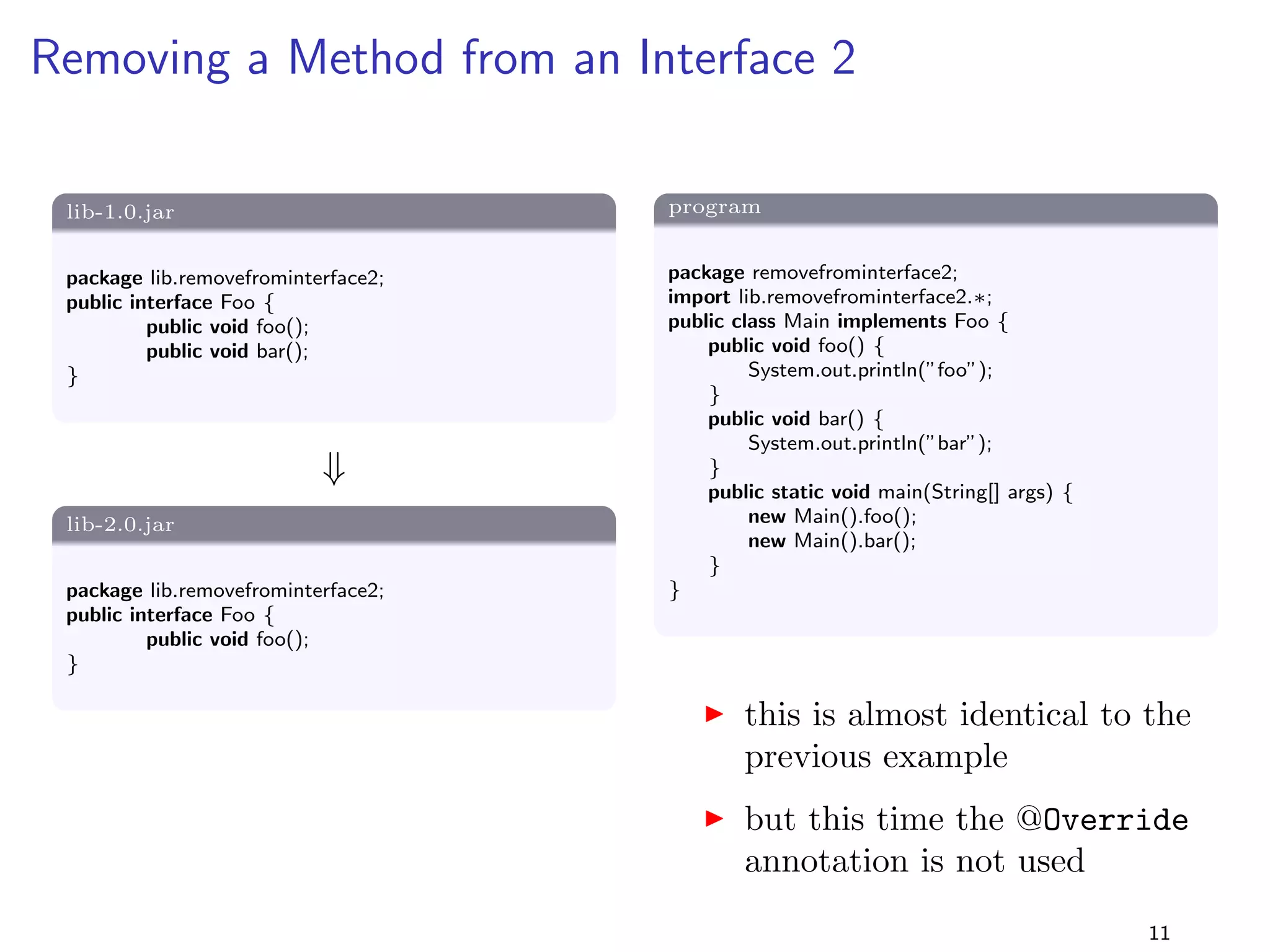
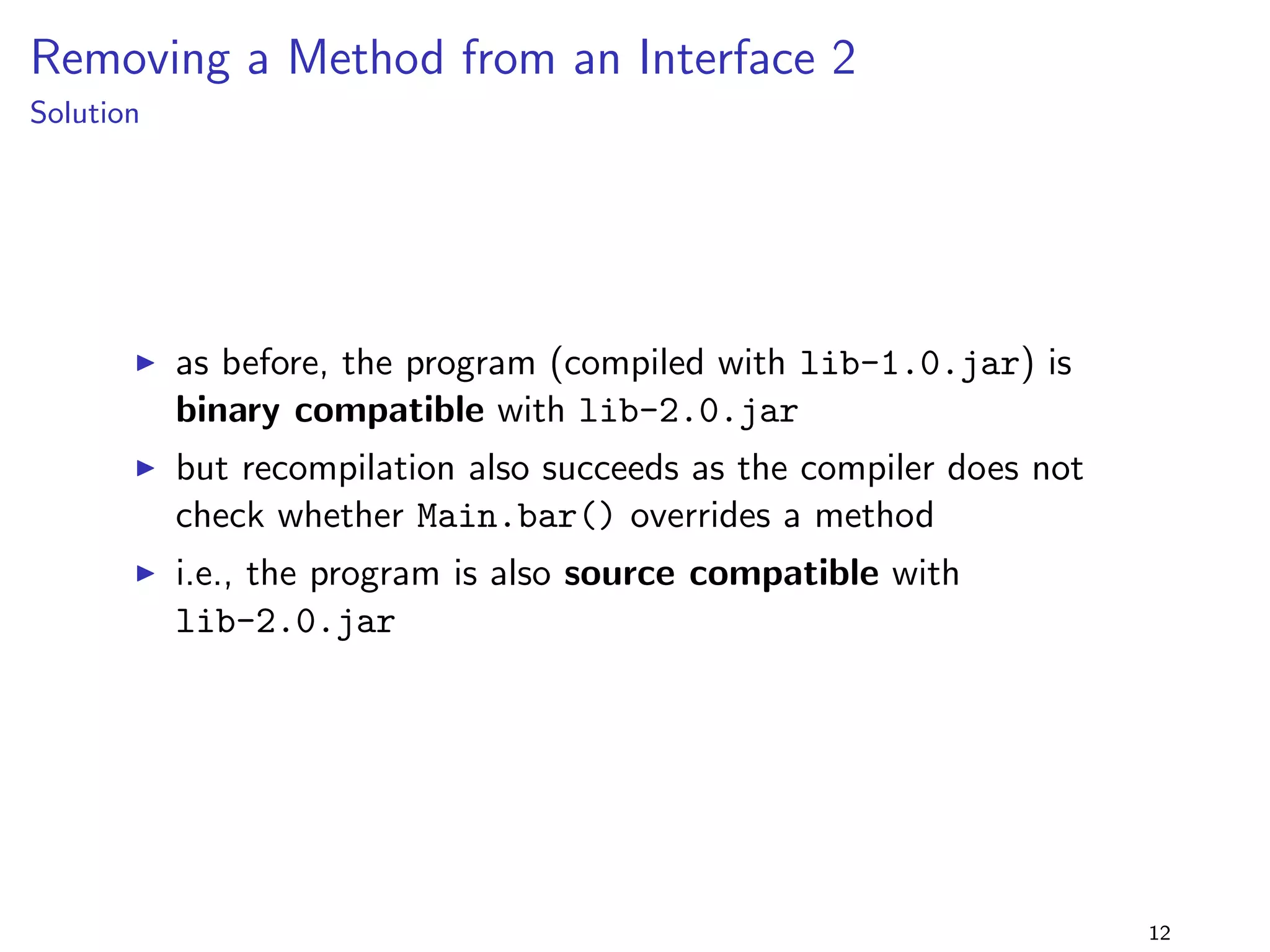
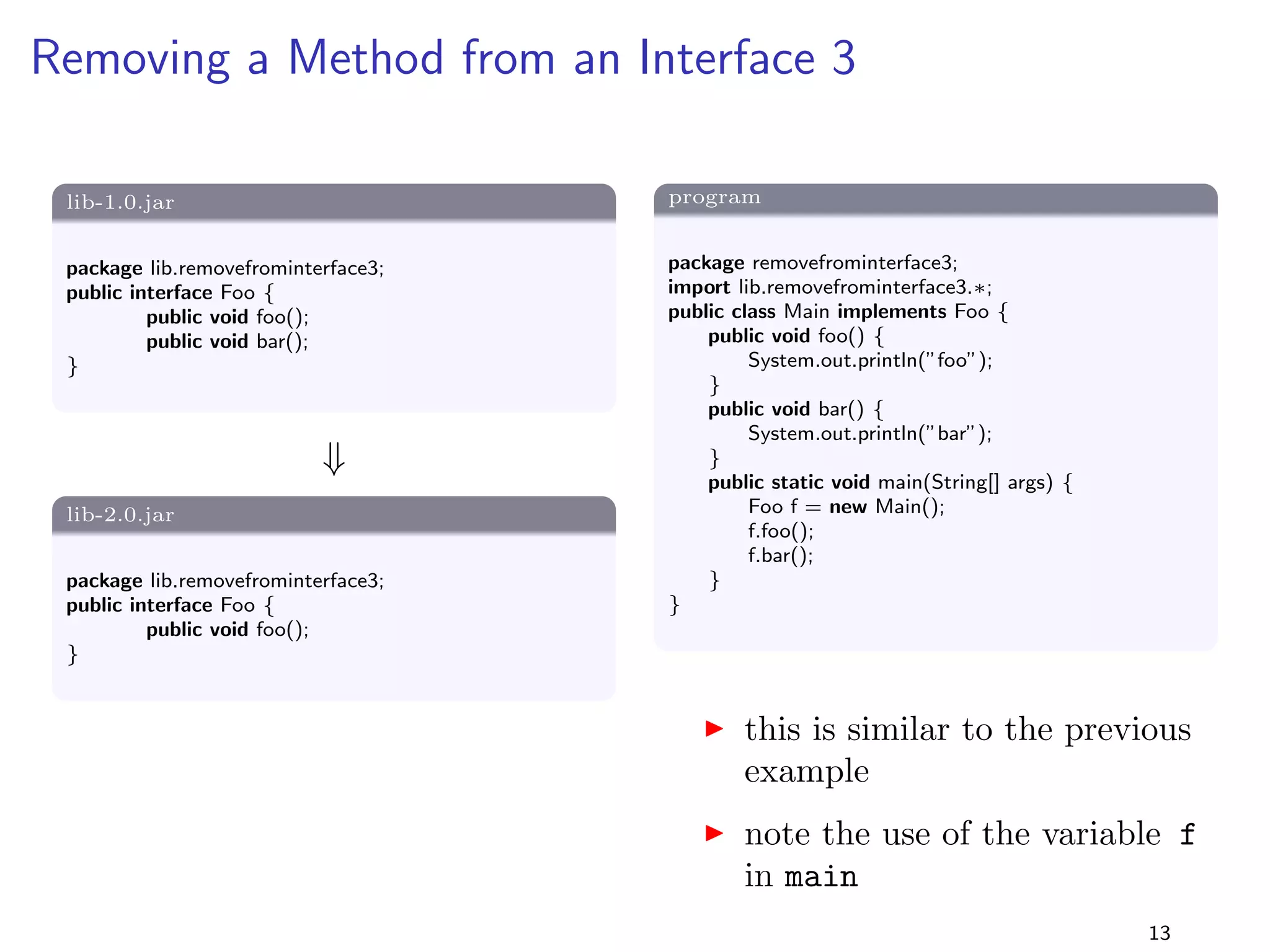
![Adding a Method to an Interface
lib-1.0.jar
package lib.addtointerface;
public interface Foo f
public void foo();
g
+
lib-2.0.jar
package lib.addtointerface;
public interface Foo f
public void foo();
public void bar();
g
program
package addtointerface;
import lib.addtointerface.;
public class Main implements Foo f
@Override public void foo() f
System.out.println(foo);
g
public static void main(String[] args) f
new Main().foo();
g
g
I the interface Foo is extended
by adding bar()
I but the client class
implements the old interface
I is this still binary compatible
with lib-2.0.jar?
10](https://image.slidesharecdn.com/presentation-140123192247-phpapp02/75/Java-Library-Evolution-Puzzlers-14-2048.jpg)
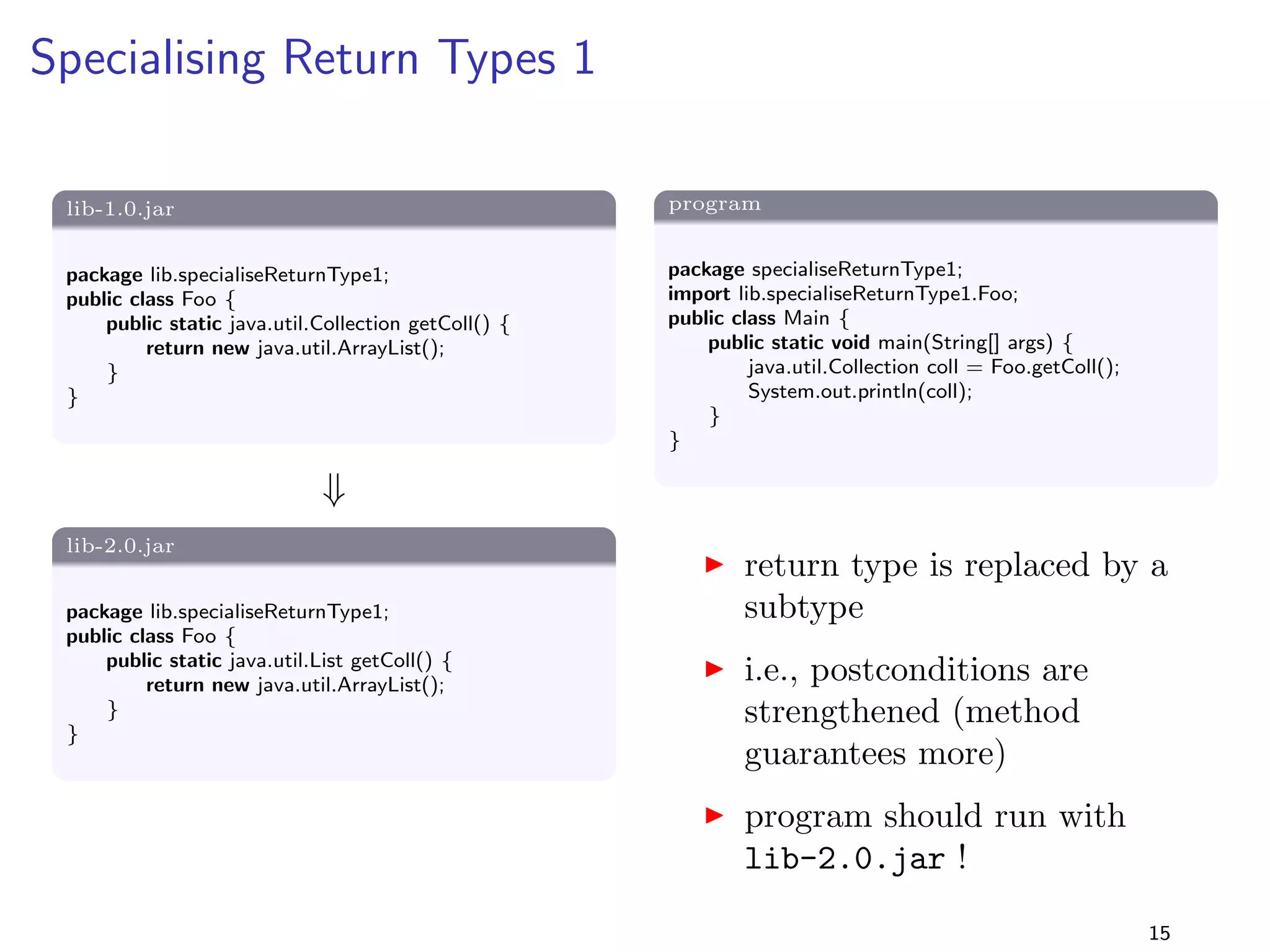
![Removing a Method from an Interface 1
lib-1.0.jar
package lib.removefrominterface1;
public interface Foo f
public void foo();
public void bar();
g
+
lib-2.0.jar
package lib.removefrominterface1;
public interface Foo f
public void foo();
g
program
package removefrominterface1;
import lib.removefrominterface1.;
public class Main implements Foo f
@Override public void foo() f
System.out.println(foo);
g
@Override public void bar() f
System.out.println(bar);
g
public static void main(String[] args) f
new Main().foo();
new Main().bar();
g
g
I the method bar() is removed
from the interface Foo
I but the client class
implements the old interface
12](https://image.slidesharecdn.com/presentation-140123192247-phpapp02/75/Java-Library-Evolution-Puzzlers-16-2048.jpg)
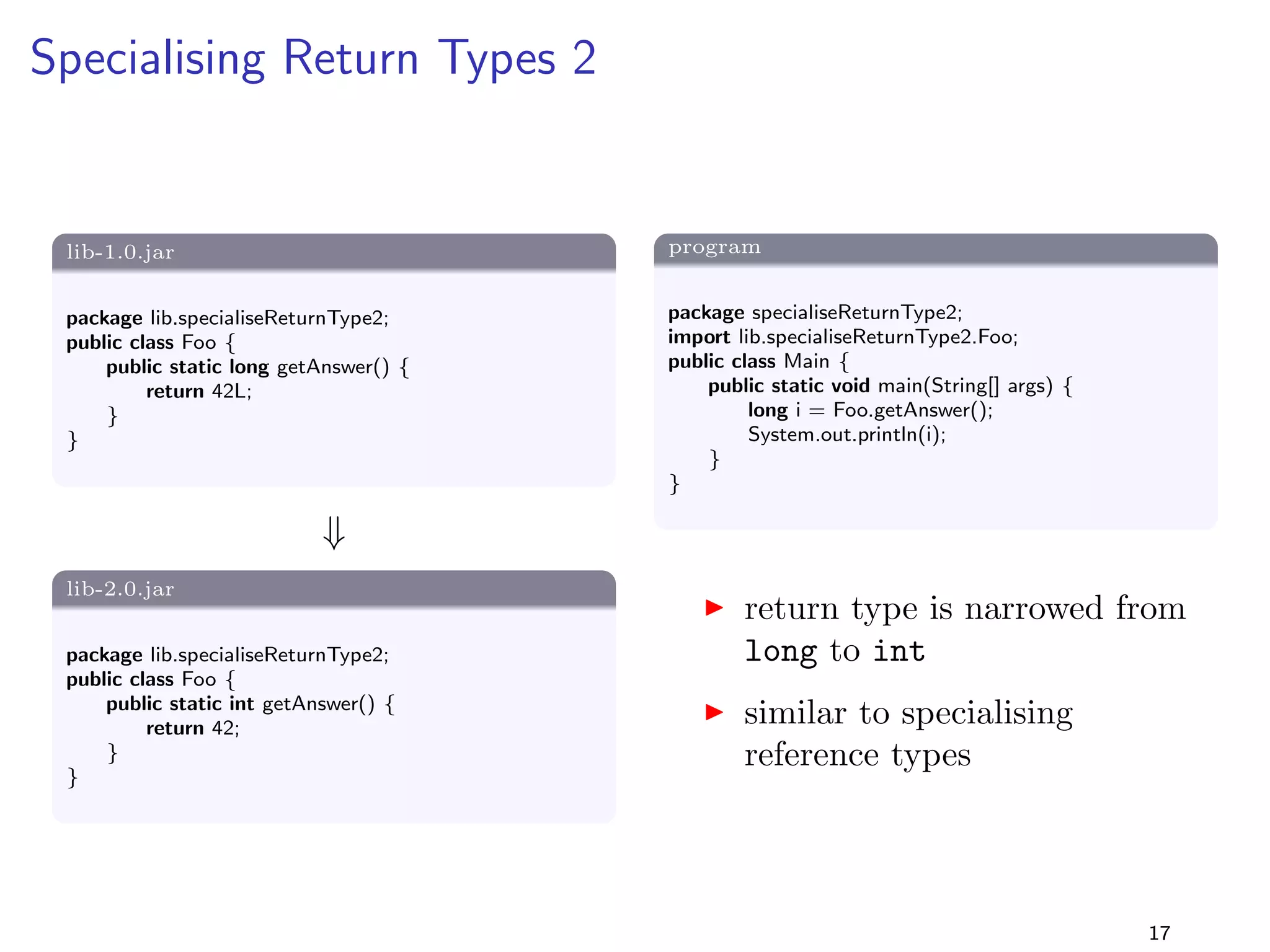
![Removing a Method from an Interface 2
lib-1.0.jar
package lib.removefrominterface2;
public interface Foo f
public void foo();
public void bar();
g
+
lib-2.0.jar
package lib.removefrominterface2;
public interface Foo f
public void foo();
g
program
package removefrominterface2;
import lib.removefrominterface2.;
public class Main implements Foo f
public void foo() f
System.out.println(foo);
g
public void bar() f
System.out.println(bar);
g
public static void main(String[] args) f
new Main().foo();
new Main().bar();
g
g
I this is almost identical to the
previous example
I but this time the @Override
annotation is not used
14](https://image.slidesharecdn.com/presentation-140123192247-phpapp02/75/Java-Library-Evolution-Puzzlers-18-2048.jpg)
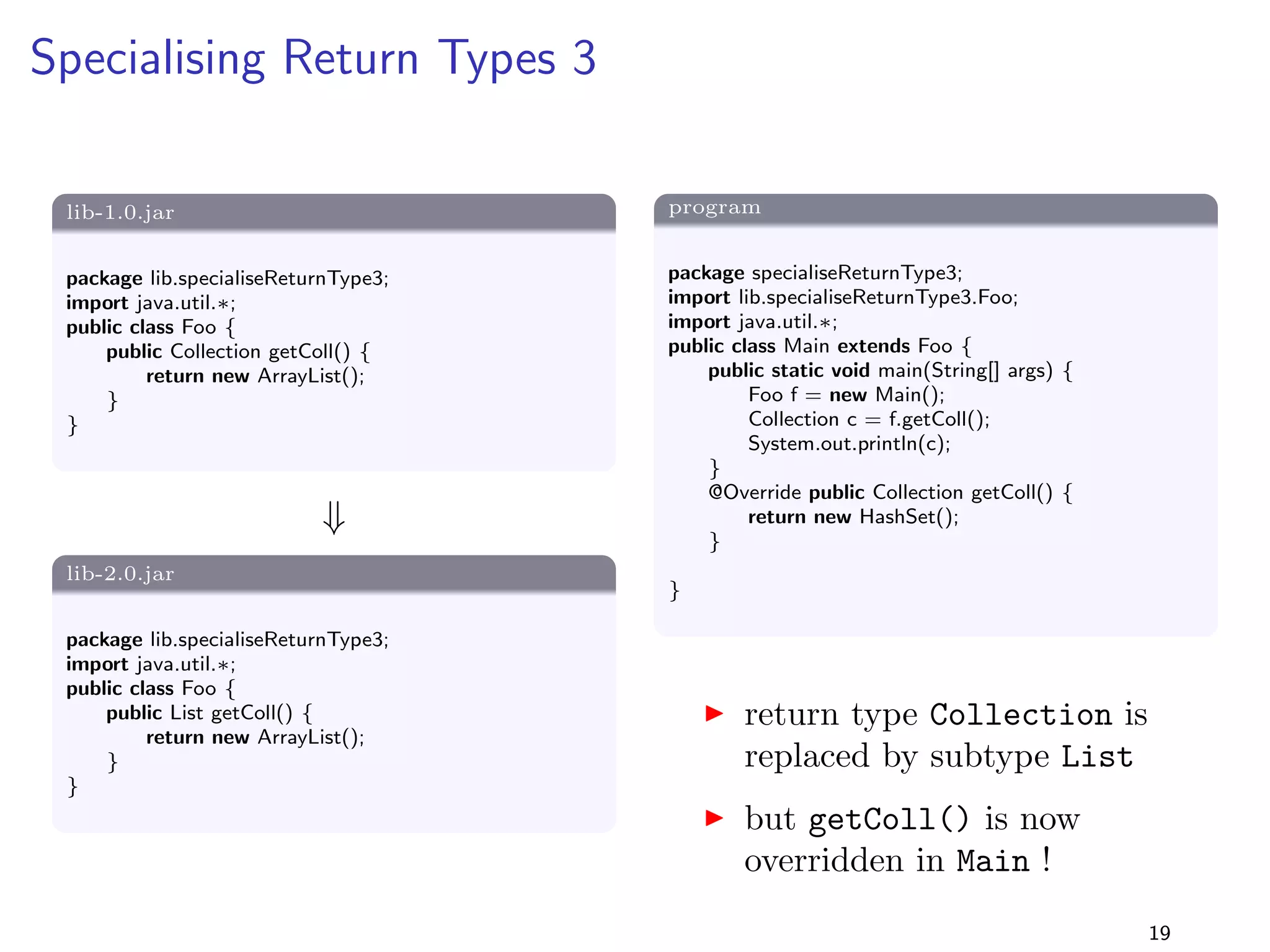
![Removing a Method from an Interface 3
lib-1.0.jar
package lib.removefrominterface3;
public interface Foo f
public void foo();
public void bar();
g
+
lib-2.0.jar
package lib.removefrominterface3;
public interface Foo f
public void foo();
g
program
package removefrominterface3;
import lib.removefrominterface3.;
public class Main implements Foo f
public void foo() f
System.out.println(foo);
g
public void bar() f
System.out.println(bar);
g
public static void main(String[] args) f
Foo f = new Main();
f.foo();
f.bar();
g
g
I this is similar to the previous
example
I note the declaration of f in
main
16](https://image.slidesharecdn.com/presentation-140123192247-phpapp02/75/Java-Library-Evolution-Puzzlers-20-2048.jpg)
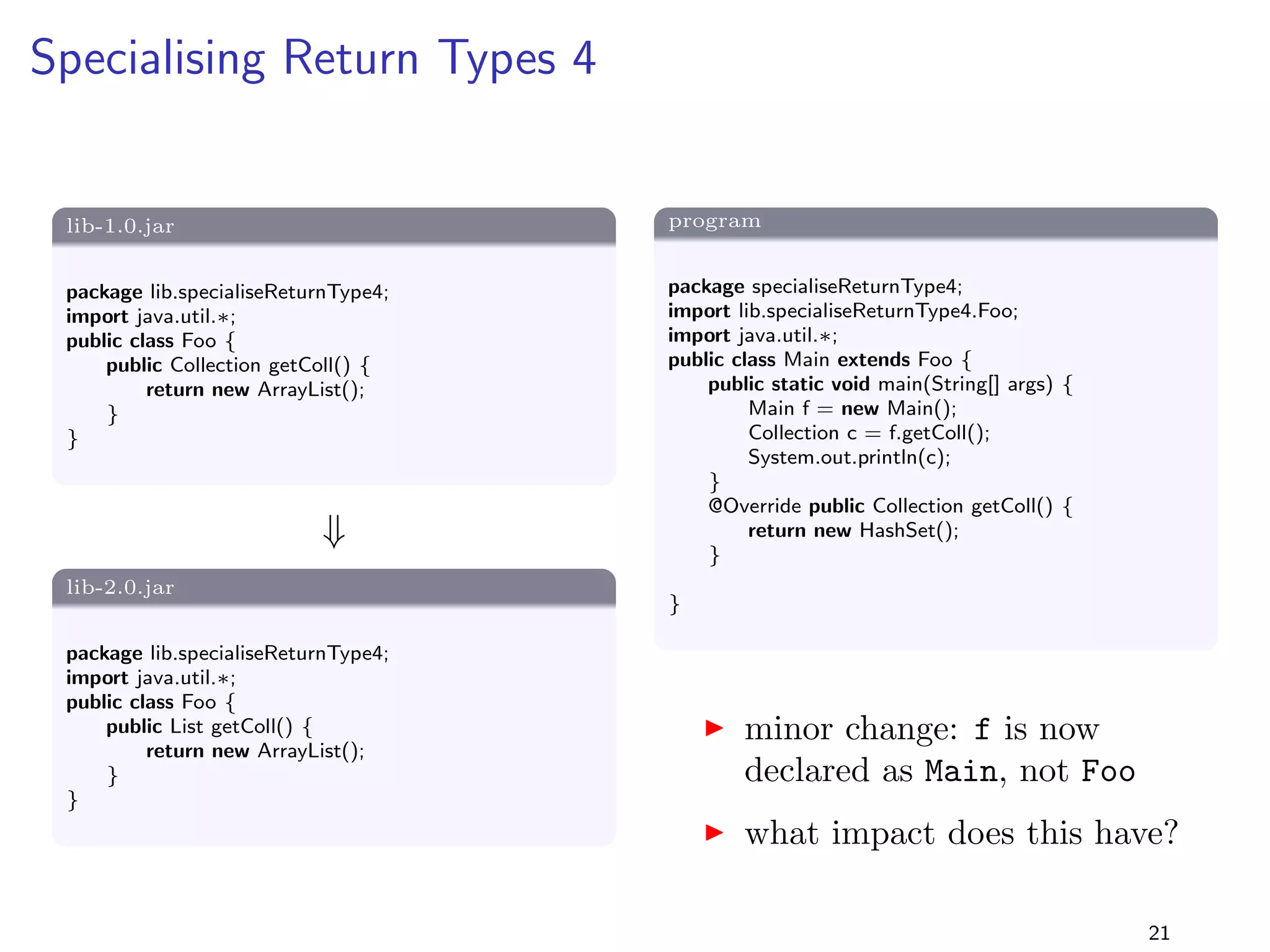
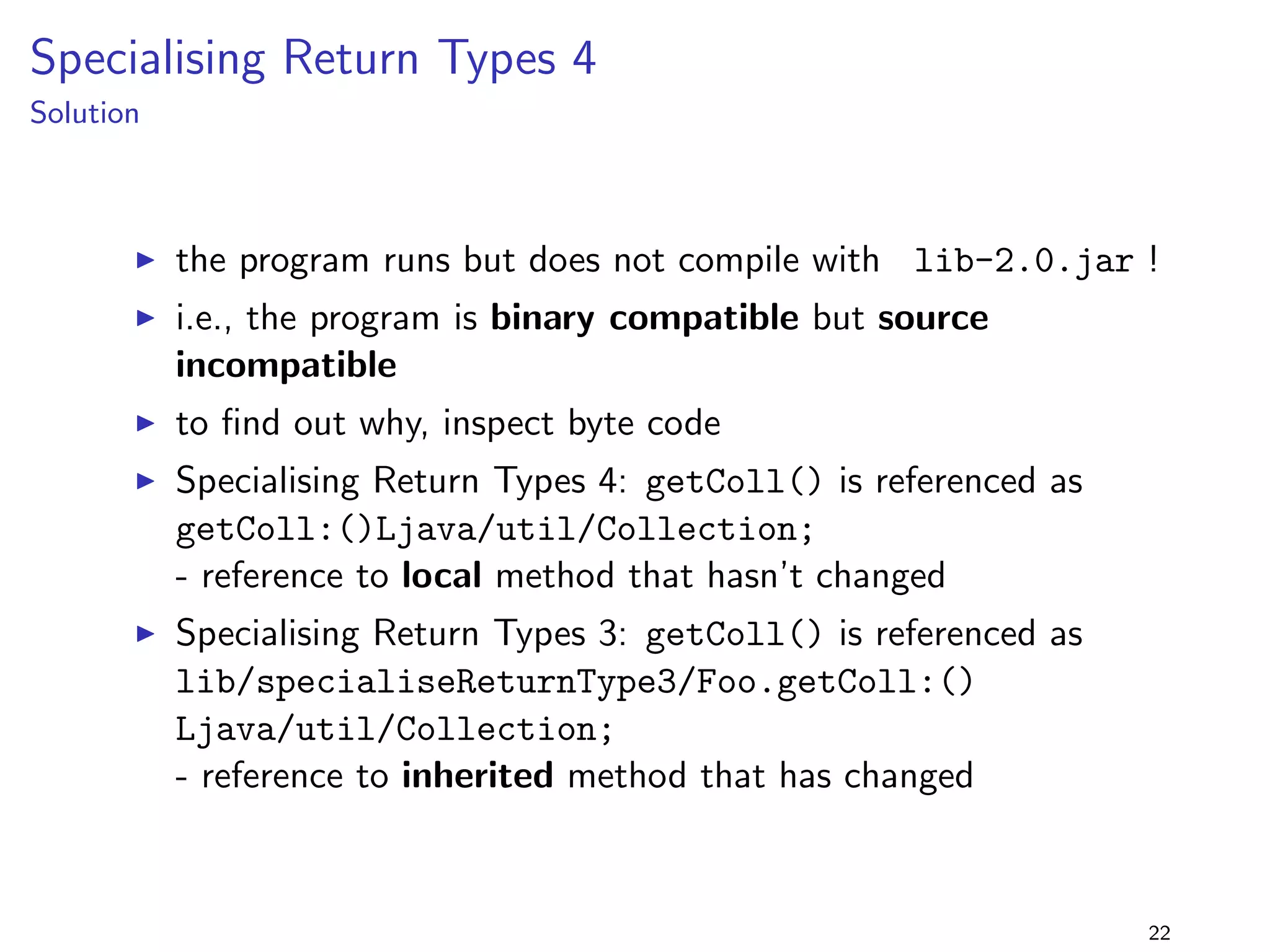
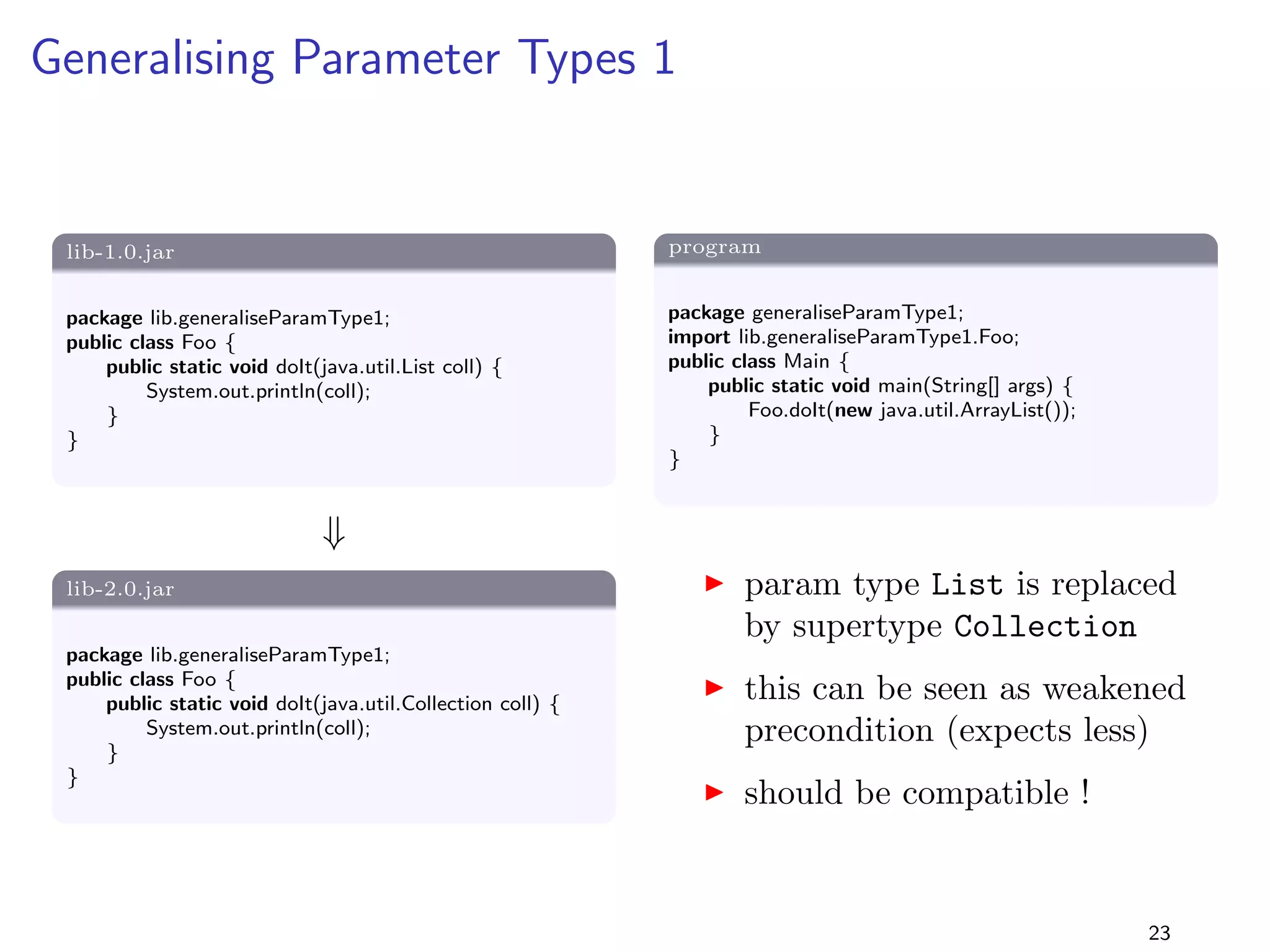
![Specialising Return Types 1
lib-1.0.jar
package lib.specialiseReturnType1;
public class Foo f
public static java.util.Collection getColl() f
return new java.util.ArrayList();
g
g
+
lib-2.0.jar
package lib.specialiseReturnType1;
public class Foo f
public static java.util.List getColl() f
return new java.util.ArrayList();
g
g
program
package specialiseReturnType1;
import lib.specialiseReturnType1.Foo;
public class Main f
public static void main(String[] args) f
java.util.Collection coll = Foo.getColl();
System.out.println(coll);
g
g
I return type is replaced by a
subtype
I i.e., postconditions are
strengthened (method
guarantees more)
I program should run with
lib-2.0.jar !
18](https://image.slidesharecdn.com/presentation-140123192247-phpapp02/75/Java-Library-Evolution-Puzzlers-24-2048.jpg)
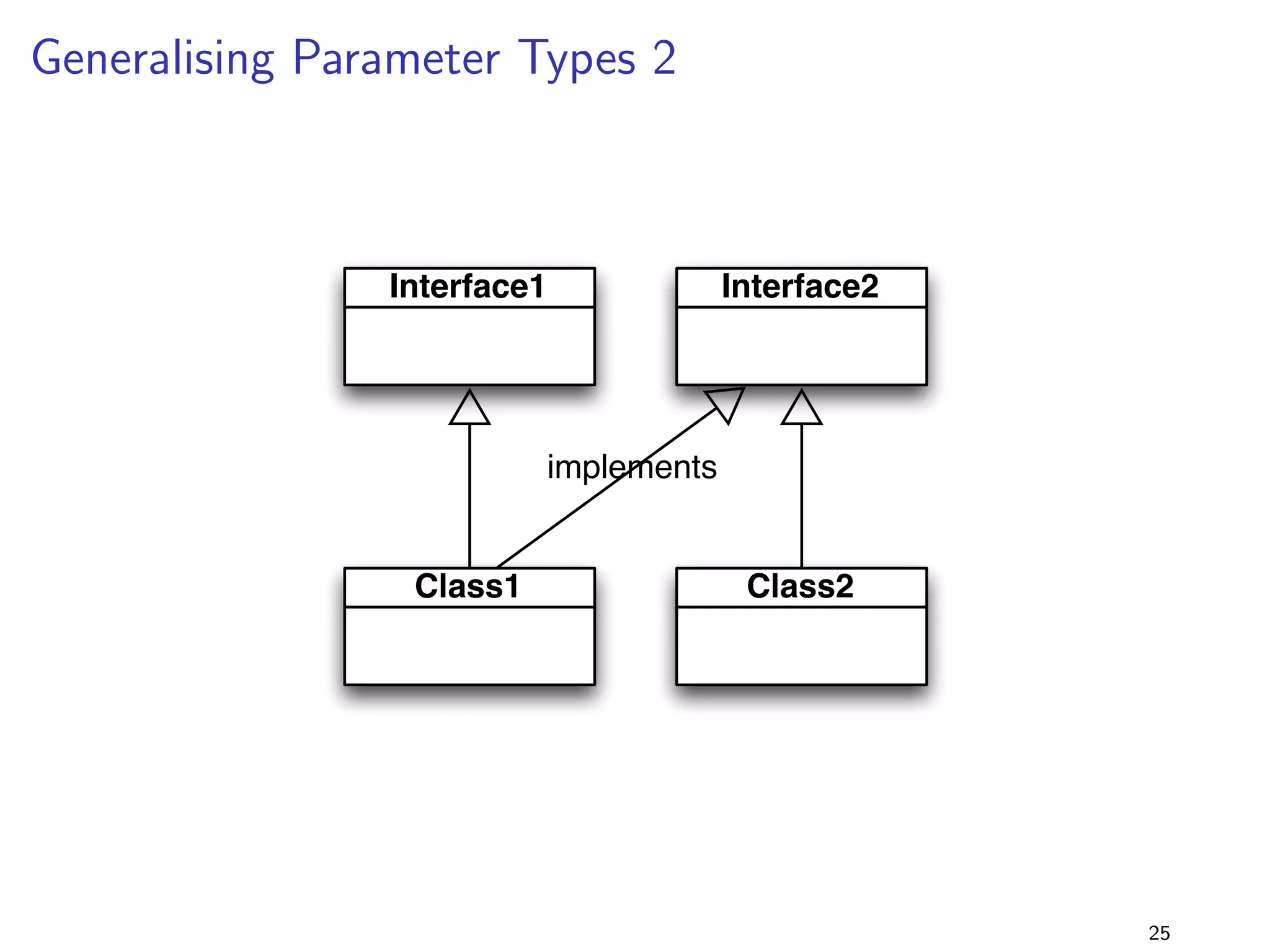
![Specialising Return Types 2
lib-1.0.jar
package lib.specialiseReturnType2;
public class Foo f
public static long getAnswer() f
return 42L;
g
g
+
lib-2.0.jar
package lib.specialiseReturnType2;
public class Foo f
public static int getAnswer() f
return 42;
g
g
program
package specialiseReturnType2;
import lib.specialiseReturnType2.Foo;
public class Main f
public static void main(String[] args) f
long i = Foo.getAnswer();
System.out.println(i);
g
g
I return type is narrowed from
long to int
I similar to specialising
reference types
20](https://image.slidesharecdn.com/presentation-140123192247-phpapp02/75/Java-Library-Evolution-Puzzlers-26-2048.jpg)
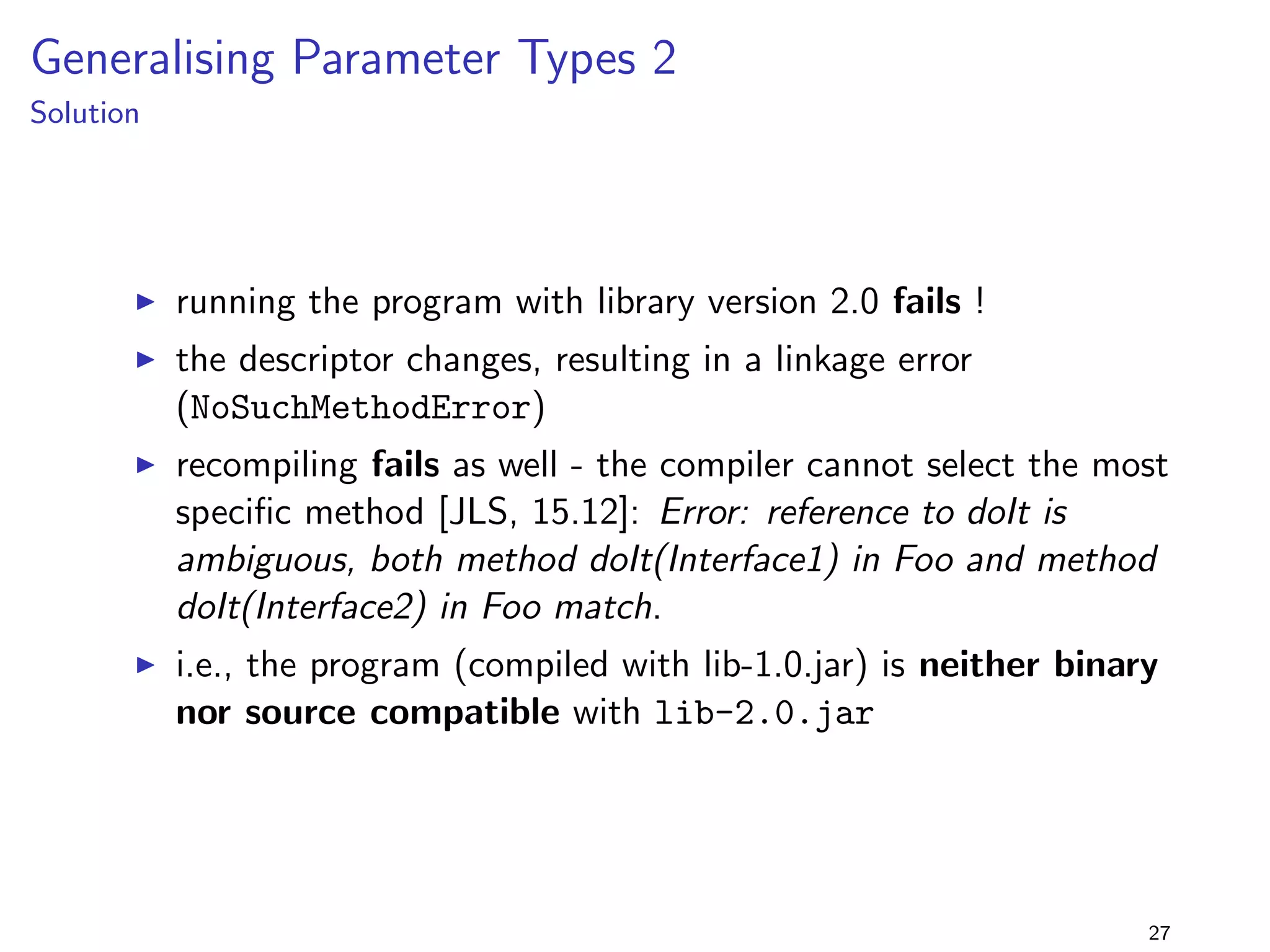
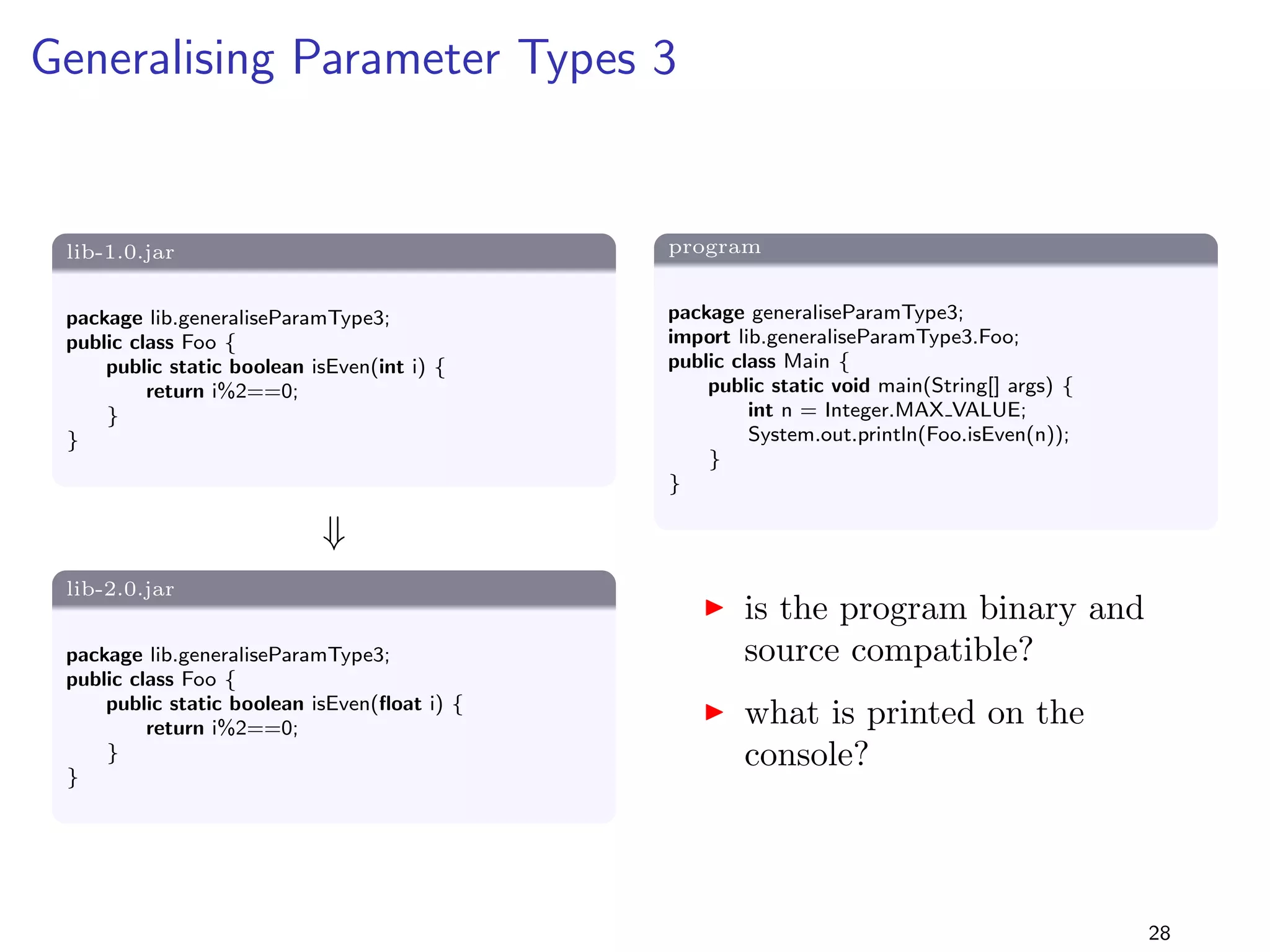
![Specialising Return Types 3
lib-1.0.jar
package lib.specialiseReturnType3;
import java.util.;
public class Foo f
public Collection getColl() f
return new ArrayList();
g
g
+
lib-2.0.jar
package lib.specialiseReturnType3;
import java.util.;
public class Foo f
public List getColl() f
return new ArrayList();
g
g
program
package specialiseReturnType3;
import lib.specialiseReturnType3.Foo;
import java.util.;
public class Main extends Foo f
public static void main(String[] args) f
Foo f = new Main();
Collection c = f.getColl();
System.out.println(c);
g
@Override public Collection getColl() f
return new HashSet();
g
g
I return type Collection is
replaced by subtype List
I but getColl() is now
overridden in Main !
22](https://image.slidesharecdn.com/presentation-140123192247-phpapp02/75/Java-Library-Evolution-Puzzlers-29-2048.jpg)
![Specialising Return Types 3
Solution
I as before, the program is binary incompatible with
lib-2.0.jar: java.lang.NoSuchMethodError:
lib.specialiseReturnType3.Foo.getColl()
Ljava/util/Collection
I recompilation with lib-2.0.jar fails as well: compiler
error: return type Collection is not compatible with List
I i.e., the program is neither binary nor source compatible
with lib-2.0.jar
I when overriding a method, the return type can only be
specialised (co-variant return types [JLS, 8.4.5]), but this does
not apply here as the overridden method itself has specialised
its return type
23](https://image.slidesharecdn.com/presentation-140123192247-phpapp02/75/Java-Library-Evolution-Puzzlers-30-2048.jpg)
![Specialising Return Types 4
lib-1.0.jar
package lib.specialiseReturnType4;
import java.util.;
public class Foo f
public Collection getColl() f
return new ArrayList();
g
g
+
lib-2.0.jar
package lib.specialiseReturnType4;
import java.util.;
public class Foo f
public List getColl() f
return new ArrayList();
g
g
program
package specialiseReturnType4;
import lib.specialiseReturnType4.Foo;
import java.util.;
public class Main extends Foo f
public static void main(String[] args) f
Main f = new Main();
Collection c = f.getColl();
System.out.println(c);
g
@Override public Collection getColl() f
return new HashSet();
g
g
I minor change: f is now
declared as Main, not Foo
I what impact does this have?
24](https://image.slidesharecdn.com/presentation-140123192247-phpapp02/75/Java-Library-Evolution-Puzzlers-31-2048.jpg)
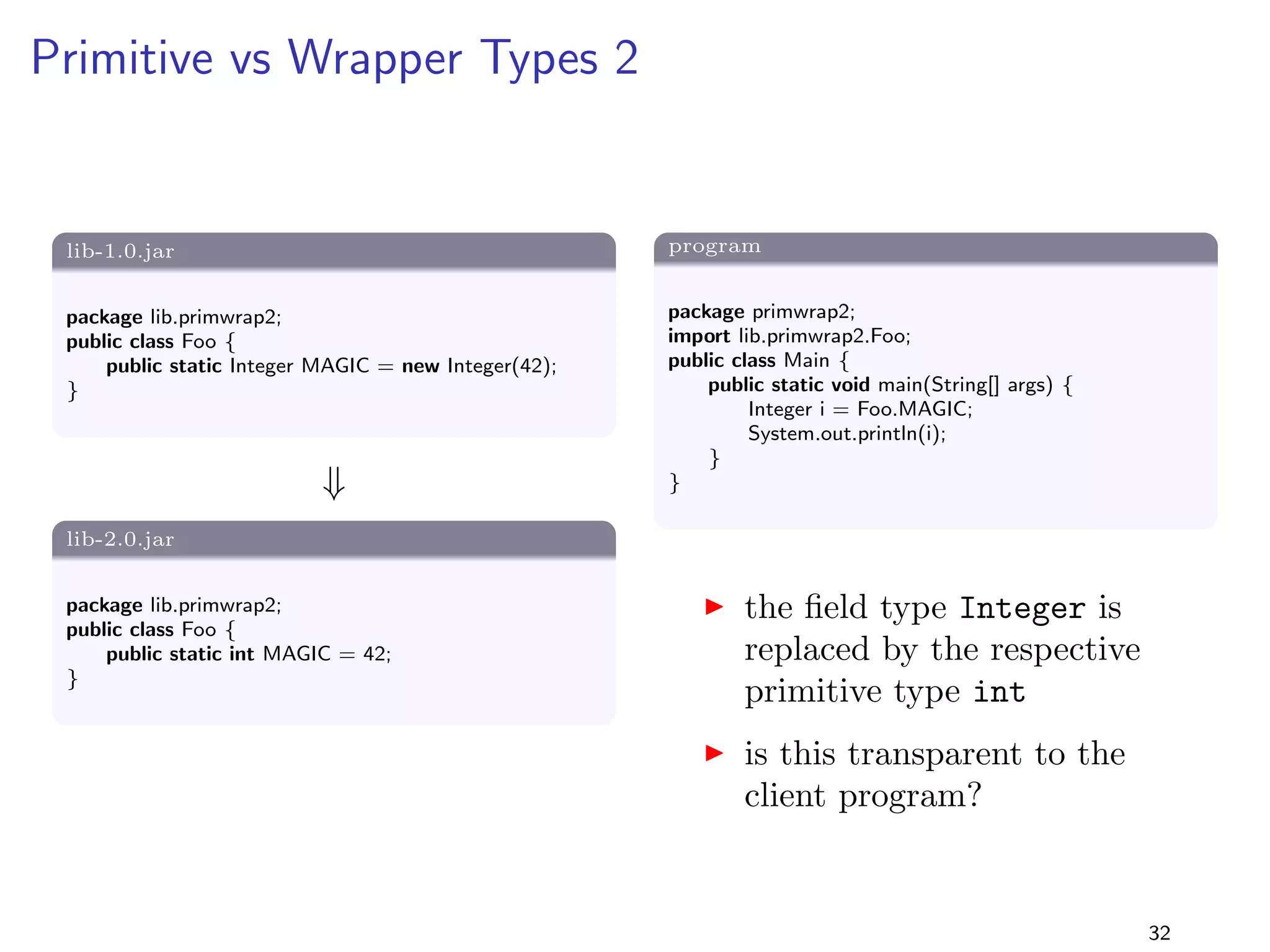
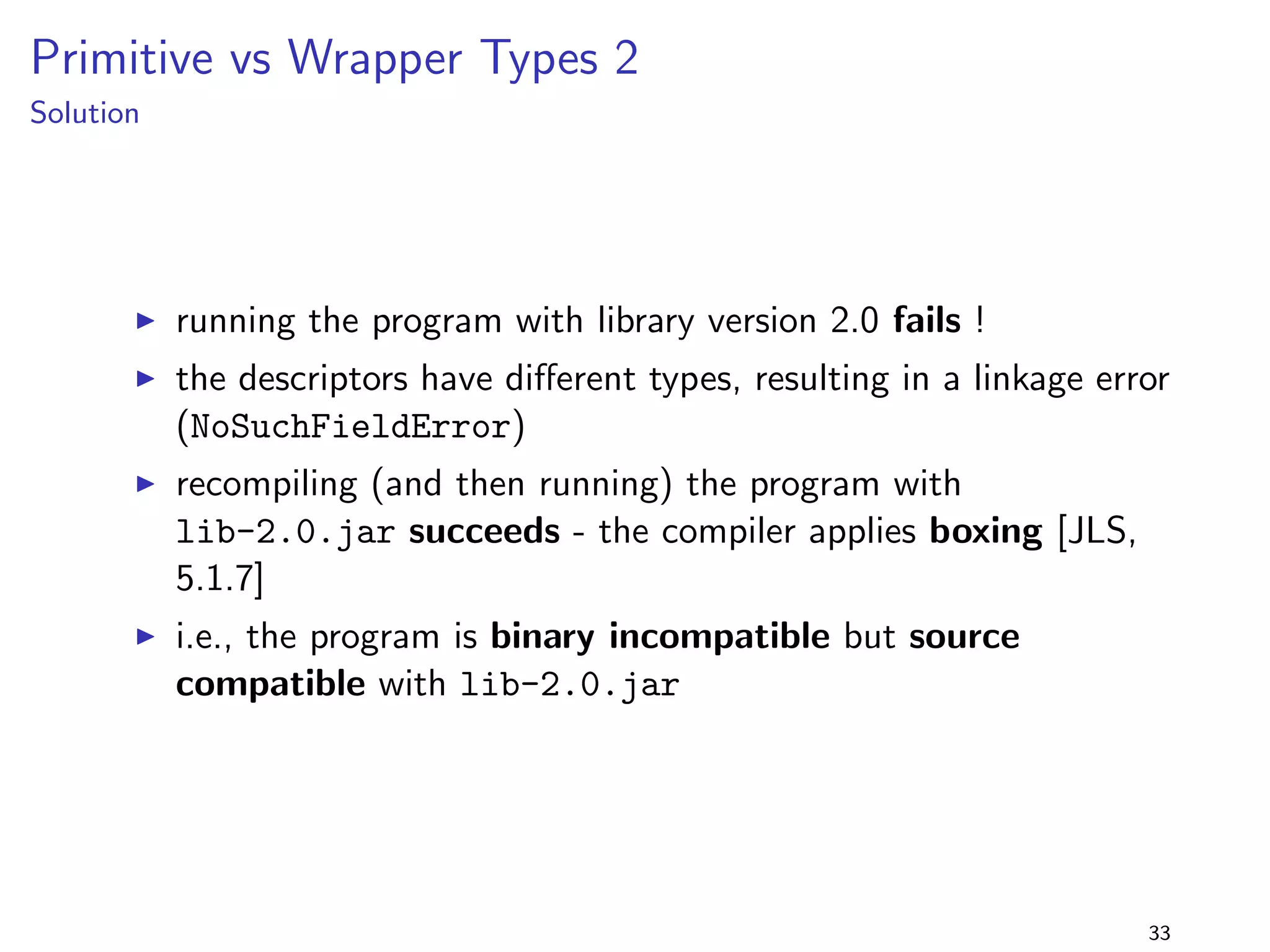
![Generalising Parameter Types 1
lib-1.0.jar
package lib.generaliseParamType1;
public class Foo f
public static void doIt(java.util.List coll) f
System.out.println(coll);
g
g
+
lib-2.0.jar
package lib.generaliseParamType1;
public class Foo f
public static void doIt(java.util.Collection coll) f
System.out.println(coll);
g
g
program
package generaliseParamType1;
import lib.generaliseParamType1.Foo;
public class Main f
public static void main(String[] args) f
Foo.doIt(new java.util.ArrayList());
g
g
I param type List is replaced
by supertype Collection
I this can be seen as weakened
precondition (expects less)
I should be compatible !
26](https://image.slidesharecdn.com/presentation-140123192247-phpapp02/75/Java-Library-Evolution-Puzzlers-34-2048.jpg)
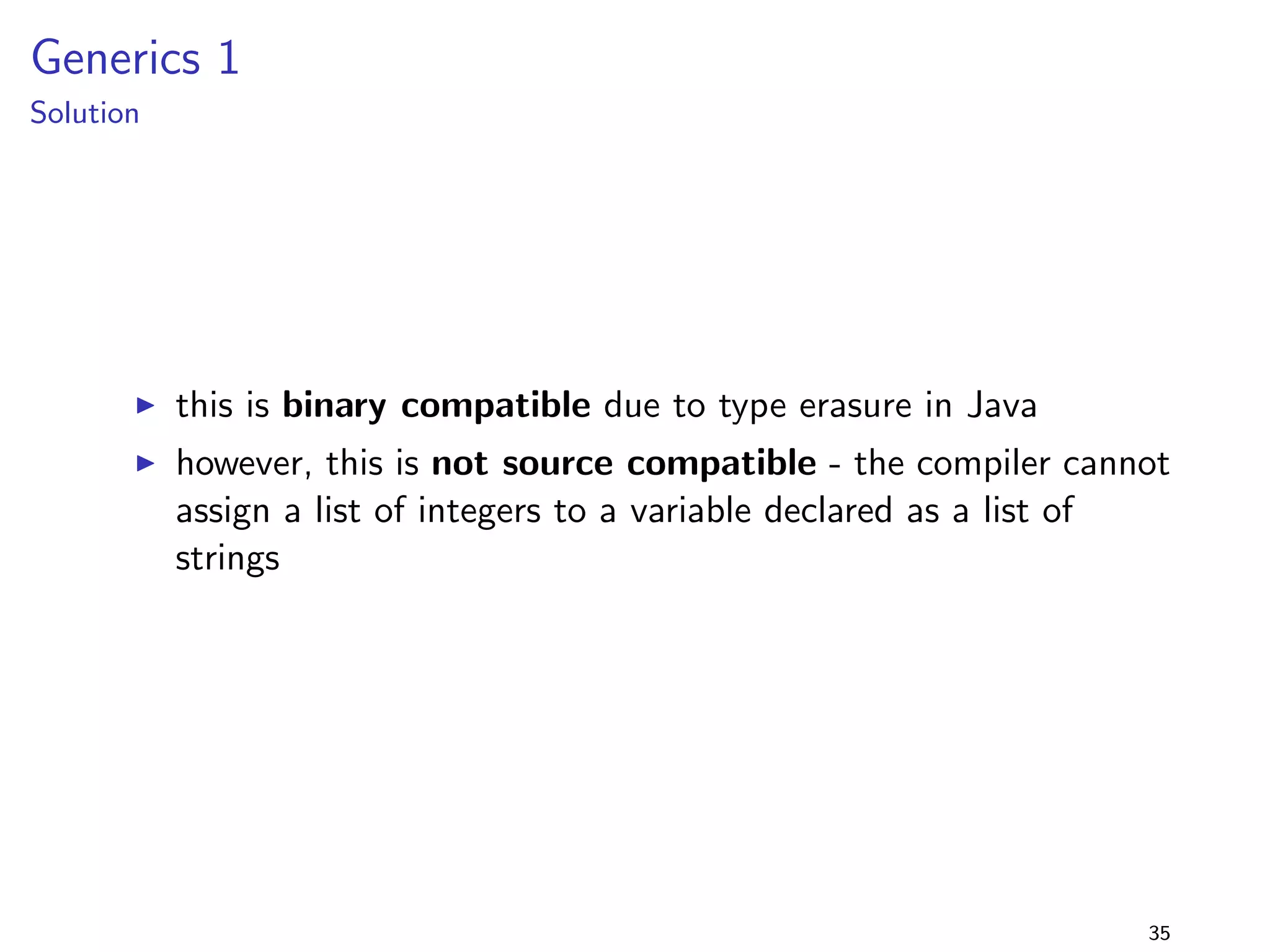
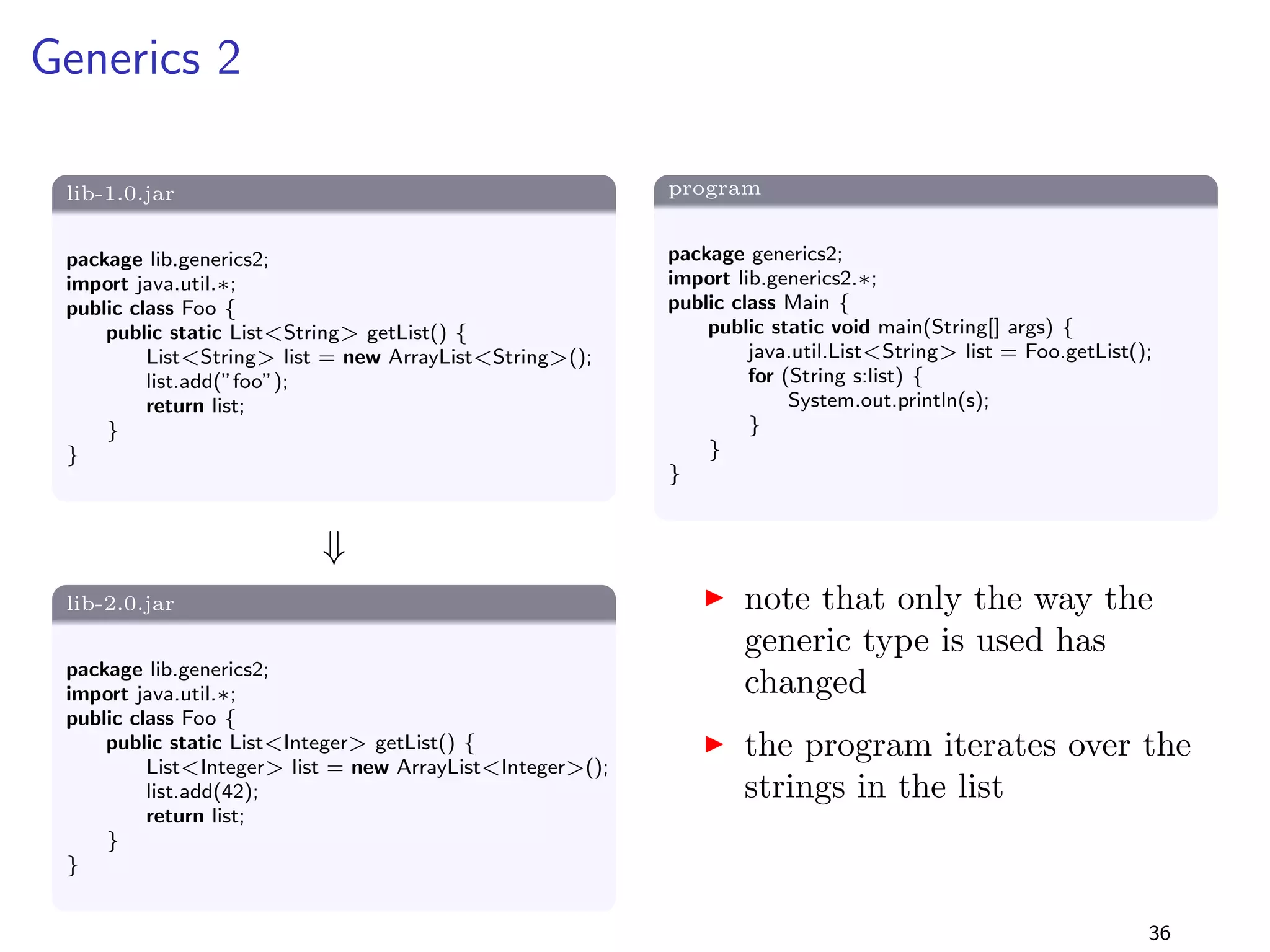
![Generalising Parameter Types 2
lib-1.0.jar
package lib.generaliseParamType2;
public class Foo f
public static void doIt(Class1 c) f
System.out.println(C1);
g
public static void doIt(Interface2 c) f
System.out.println(I2);
g
g
+
lib-2.0.jar
package lib.generaliseParamType2;
public class Foo f
public static void doIt(Interface1 c) f
System.out.println(I1);
g
public static void doIt(Interface2 c) f
System.out.println(I2);
g
g
program
package generaliseParamType2;
import lib.generaliseParamType2.;
public class Main f
public static void main(String[] args) f
Foo.doIt(new Class1());
g
g
I doIt is overloaded
I can the compiler select a
method after generalising the
parameter type?
29](https://image.slidesharecdn.com/presentation-140123192247-phpapp02/75/Java-Library-Evolution-Puzzlers-37-2048.jpg)
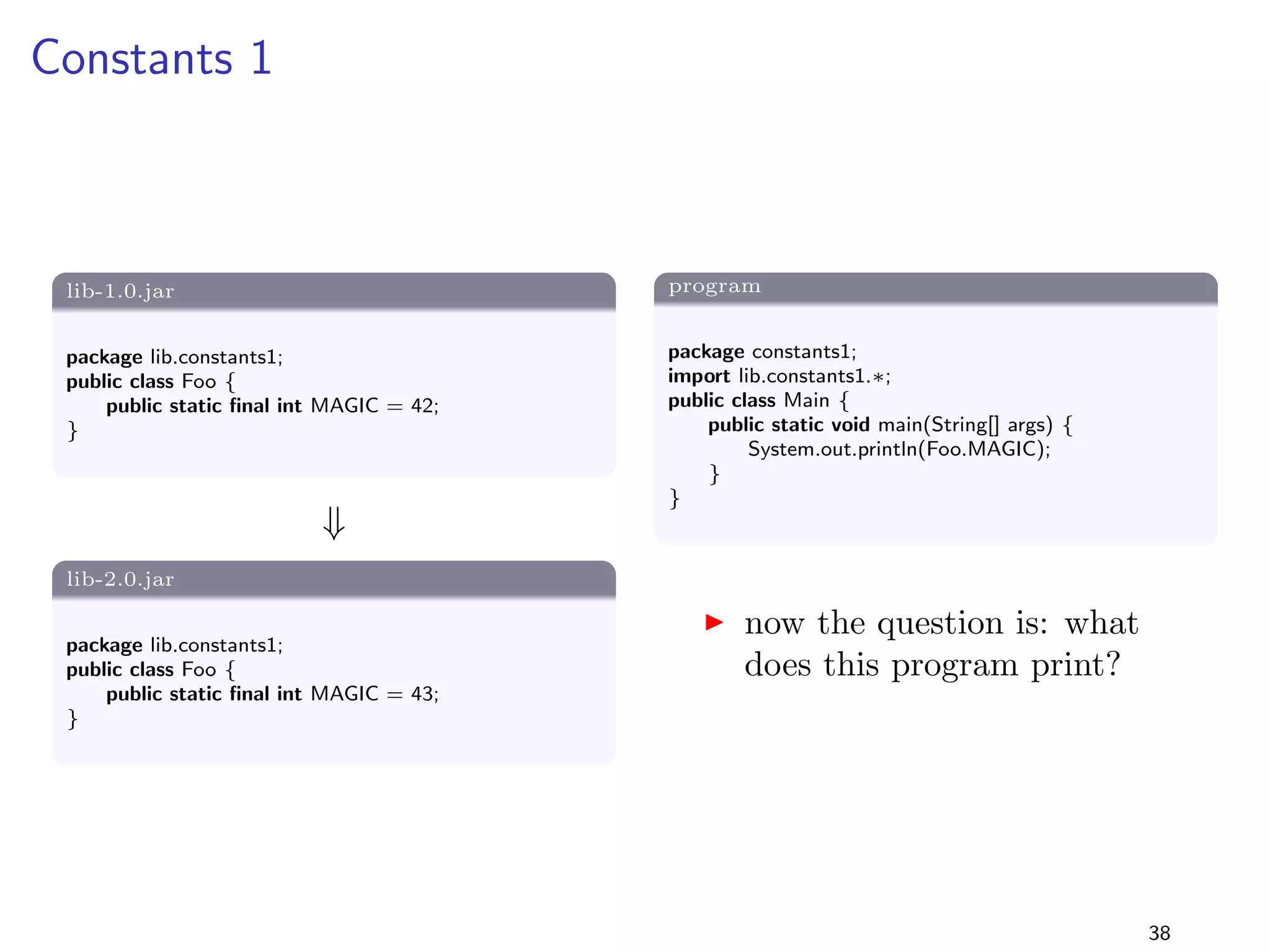
![c method [JLS, 15.12]: Error: reference to doIt is
ambiguous, both method doIt(Interface1) in Foo and method
doIt(Interface2) in Foo match.
I i.e., the program (compiled with lib-1.0.jar) is neither binary
nor source compatible with lib-2.0.jar
30](https://image.slidesharecdn.com/presentation-140123192247-phpapp02/75/Java-Library-Evolution-Puzzlers-39-2048.jpg)
![Generalising Parameter Types 3
lib-1.0.jar
package lib.generaliseParamType3;
public class Foo f
public static boolean isEven(int i) f
return i%2==0;
g
g
+
lib-2.0.jar
package lib.generaliseParamType3;
public class Foo f
public static boolean isEven(
oat i) f
return i%2==0;
g
g
program
package generaliseParamType3;
import lib.generaliseParamType3.Foo;
public class Main f
public static void main(String[] args) f
int n = Integer.MAX VALUE;
System.out.println(Foo.isEven(n));
g
g
I is the program binary and
source compatible?
I what is printed on the
console?
31](https://image.slidesharecdn.com/presentation-140123192247-phpapp02/75/Java-Library-Evolution-Puzzlers-40-2048.jpg)
![Generalising Parameter Types 3
Solution
I the program is not binary compatible with lib-2.0.jar,
but seems to be source compatible - it can be recompiled
and then executed
I however, the output changes: while the original program
prints true, the recompiled program prints false
I the type parameter change changes the semantics of the
program - although the method body is not changed !
I the change is source compatible, but source behavioural
incompatible
I the problem is that the widening conversion from int to
float results in loss of precision [JLS, ch. 5.1.2]
32](https://image.slidesharecdn.com/presentation-140123192247-phpapp02/75/Java-Library-Evolution-Puzzlers-41-2048.jpg)
![Change a Method from Static to Non-Static
lib-1.0.jar
package lib.static1;
public class Foo f
public static void foo() f
System.out.println(foo);
g
g
+
lib-2.0.jar
package lib.static1;
public class Foo f
public void foo() f
System.out.println(foo);
g
g
program
package static1;
import lib.static1.Foo;
public class Main f
public static void main(String[] args) f
Foo.foo();
g
g
I remove the static modi](https://image.slidesharecdn.com/presentation-140123192247-phpapp02/75/Java-Library-Evolution-Puzzlers-42-2048.jpg)
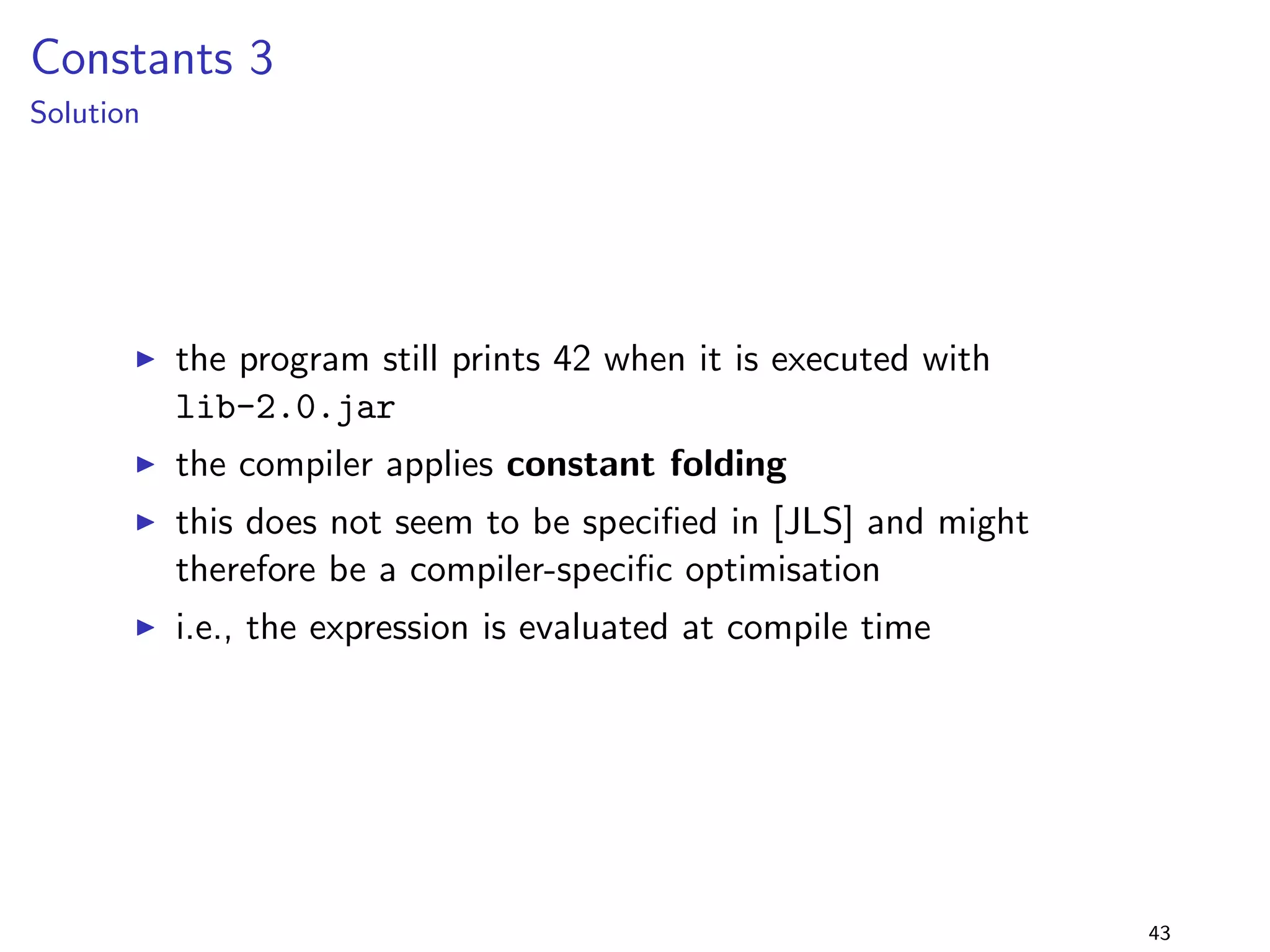
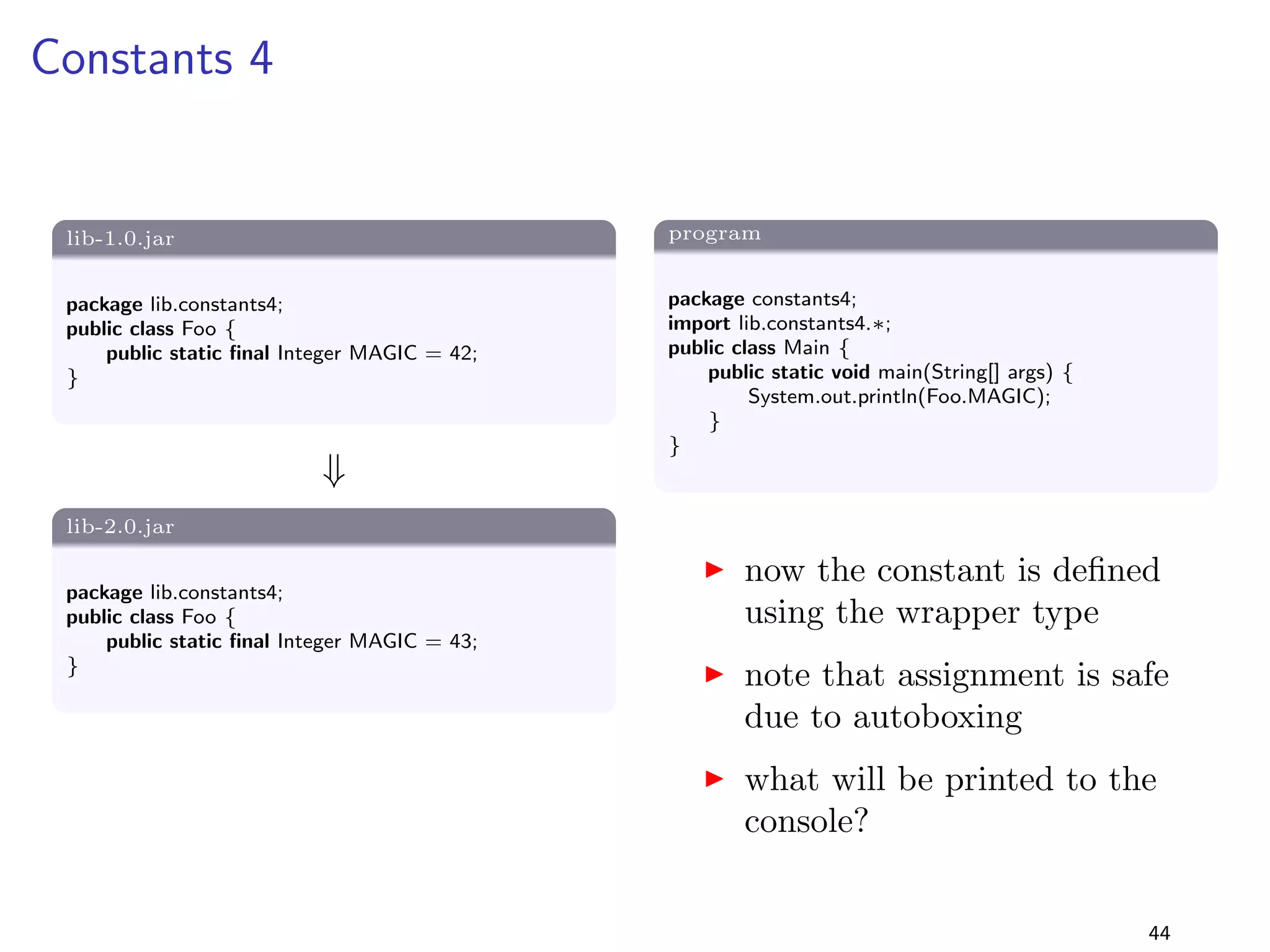
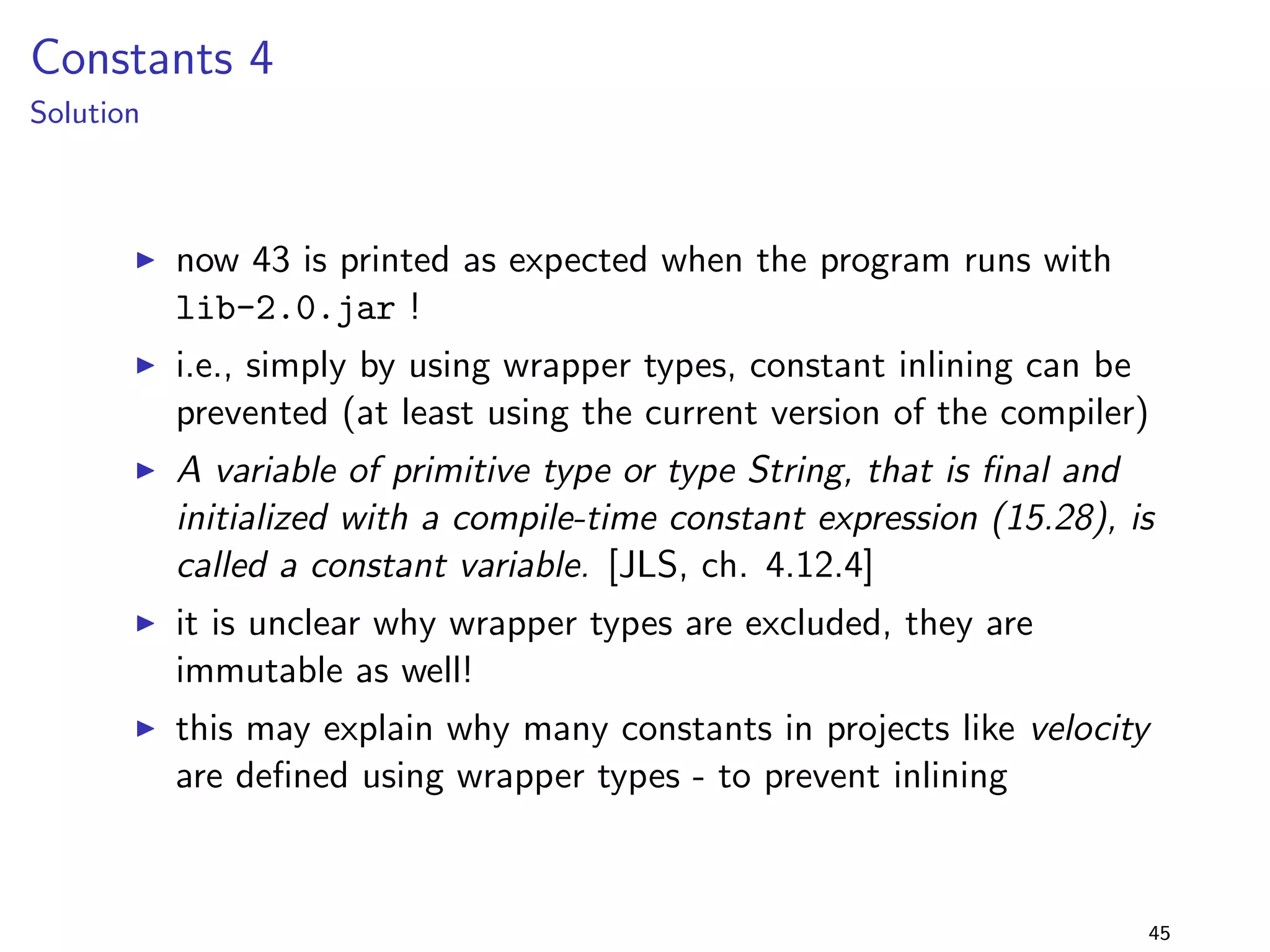
![Change a Method from Non-Static to Static
lib-1.0.jar
package lib.static2;
public class Foo f
public void foo() f
System.out.println(foo);
g
g
+
lib-2.0.jar
package lib.static2;
public class Foo f
public static void foo() f
System.out.println(foo);
g
g
program
package static2;
import lib.static2.Foo;
public class Main f
public static void main(String[] args) f
new Foo().foo();
g
g
I add a static modi](https://image.slidesharecdn.com/presentation-140123192247-phpapp02/75/Java-Library-Evolution-Puzzlers-46-2048.jpg)
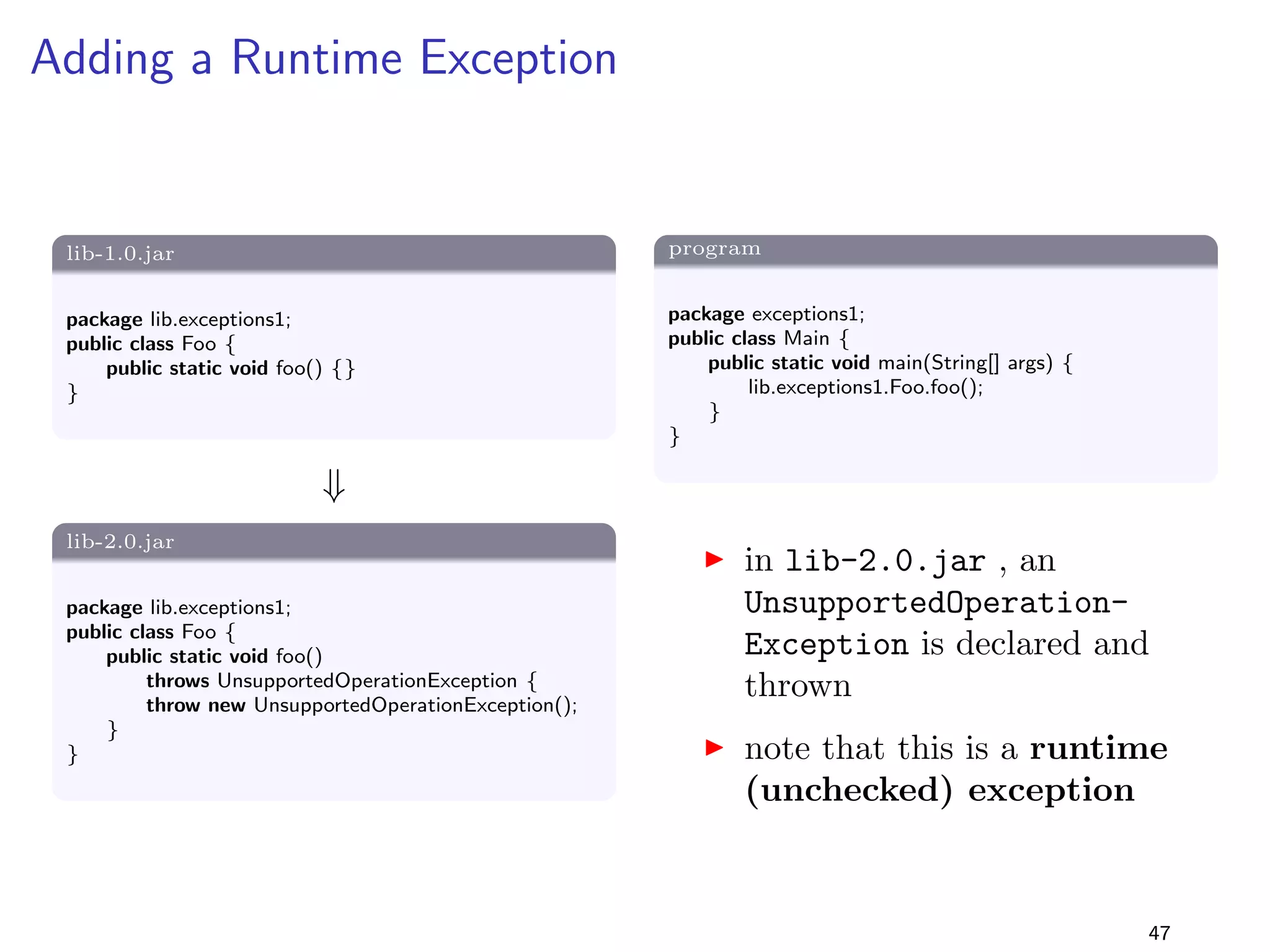
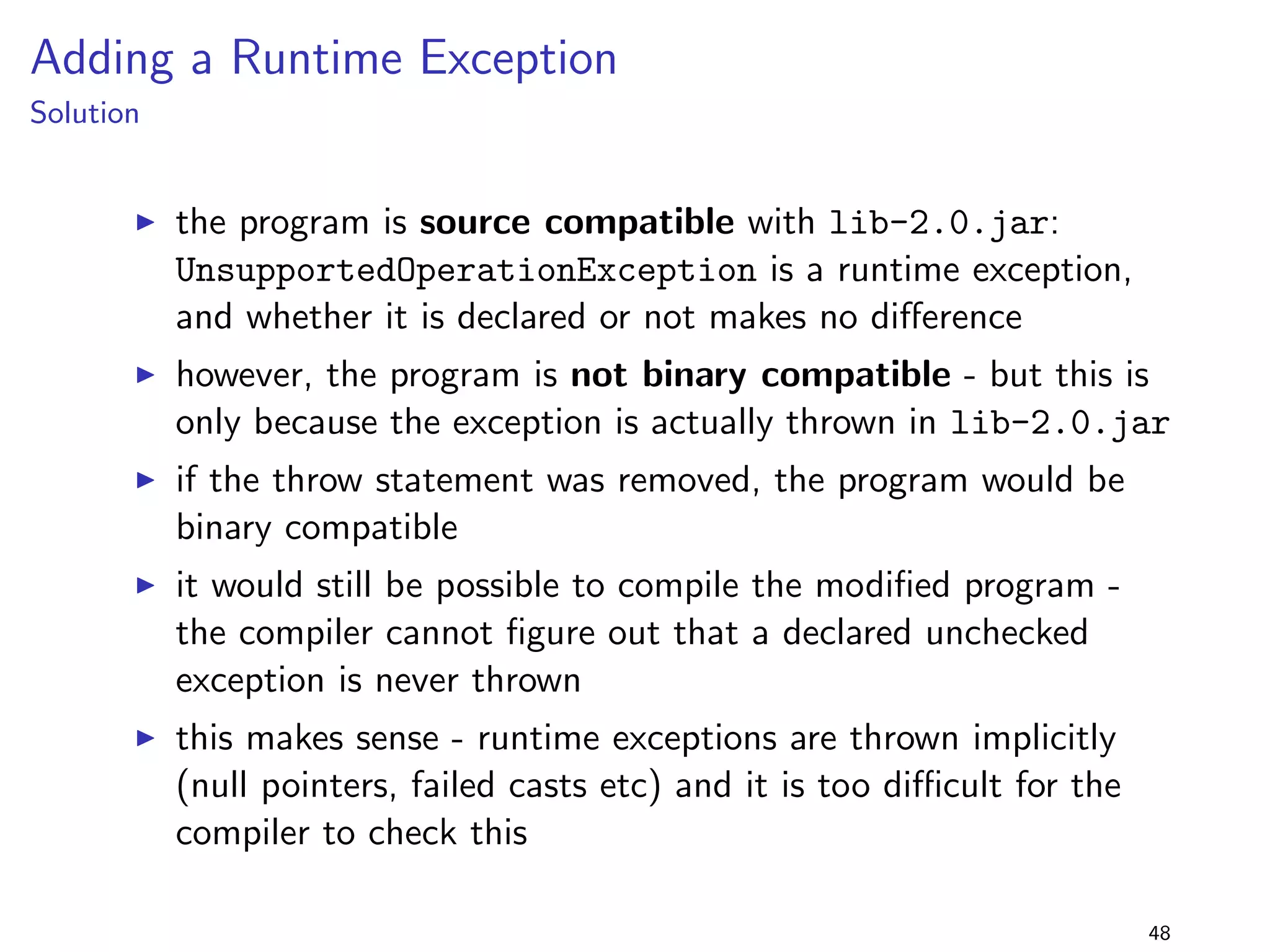
![Static vs Non-Static
Solution
I the reason is the use of dierent byte code instructions:
I static methods are invoked using invokestatic, for
non-static methods, invokevirtual is used instead
I the JVM checks the method type during linking, and creates
an IncompatibleClassChangeError if a unexpected type is
encountered [JVMS, ch. 5.4]
I the same applies for](https://image.slidesharecdn.com/presentation-140123192247-phpapp02/75/Java-Library-Evolution-Puzzlers-49-2048.jpg)
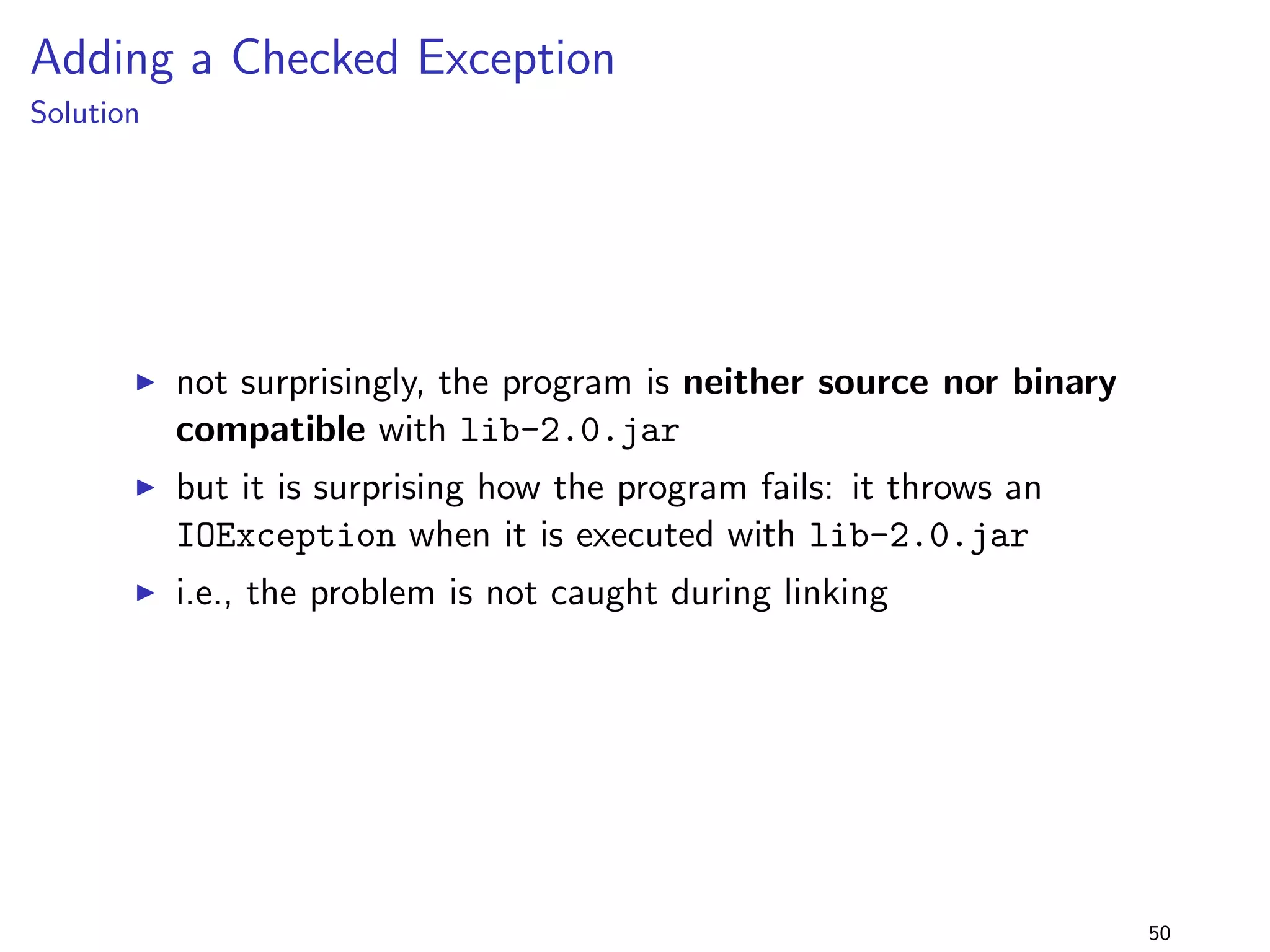
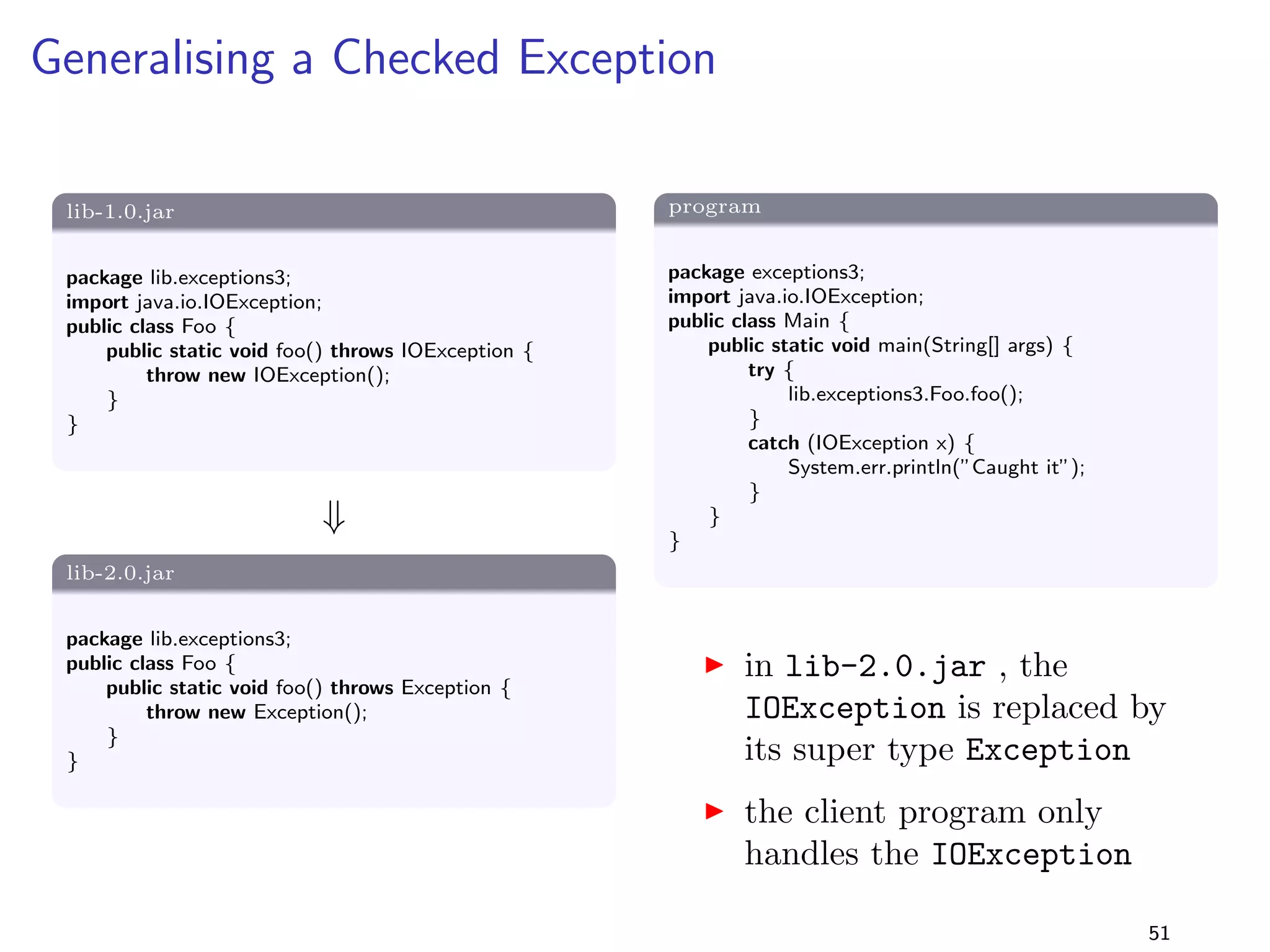
![Primitive vs Wrapper Types 1
lib-1.0.jar
package lib.primwrap1;
public class Foo f
public static int MAGIC = 42;
g
+
lib-2.0.jar
package lib.primwrap1;
public class Foo f
public static Integer MAGIC = new Integer(42);
g
program
package primwrap1;
import lib.primwrap1.Foo;
public class Main f
public static void main(String[] args) f
int i = Foo.MAGIC;
System.out.println(i);
g
g
I the](https://image.slidesharecdn.com/presentation-140123192247-phpapp02/75/Java-Library-Evolution-Puzzlers-52-2048.jpg)
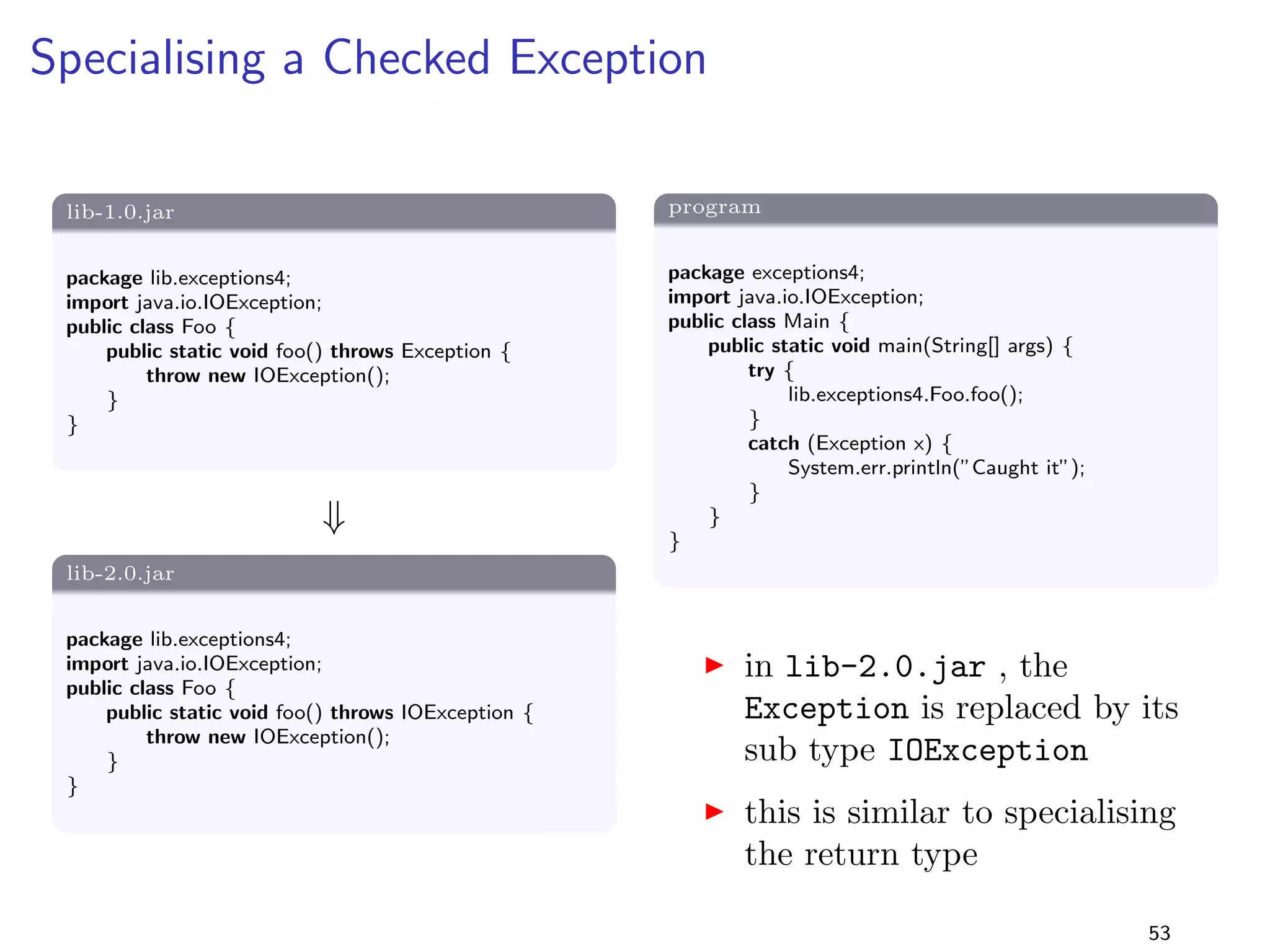
![Primitive vs Wrapper Types 1
Solution
I running the program with library version 2.0 fails !
I the descriptors have types, resulting in a linkage error
(NoSuchFieldError)
I recompiling (and then running) the program with
lib-2.0.jar succeeds - the compiler applies unboxing
[JLS, 5.1.8]
I i.e., the program is binary incompatible but source
compatible with lib-2.0.jar
39](https://image.slidesharecdn.com/presentation-140123192247-phpapp02/75/Java-Library-Evolution-Puzzlers-54-2048.jpg)
![Primitive vs Wrapper Types 2
lib-1.0.jar
package lib.primwrap2;
public class Foo f
public static Integer MAGIC = new Integer(42);
g
+
lib-2.0.jar
package lib.primwrap2;
public class Foo f
public static int MAGIC = 42;
g
program
package primwrap2;
import lib.primwrap2.Foo;
public class Main f
public static void main(String[] args) f
Integer i = Foo.MAGIC;
System.out.println(i);
g
g
I the](https://image.slidesharecdn.com/presentation-140123192247-phpapp02/75/Java-Library-Evolution-Puzzlers-55-2048.jpg)
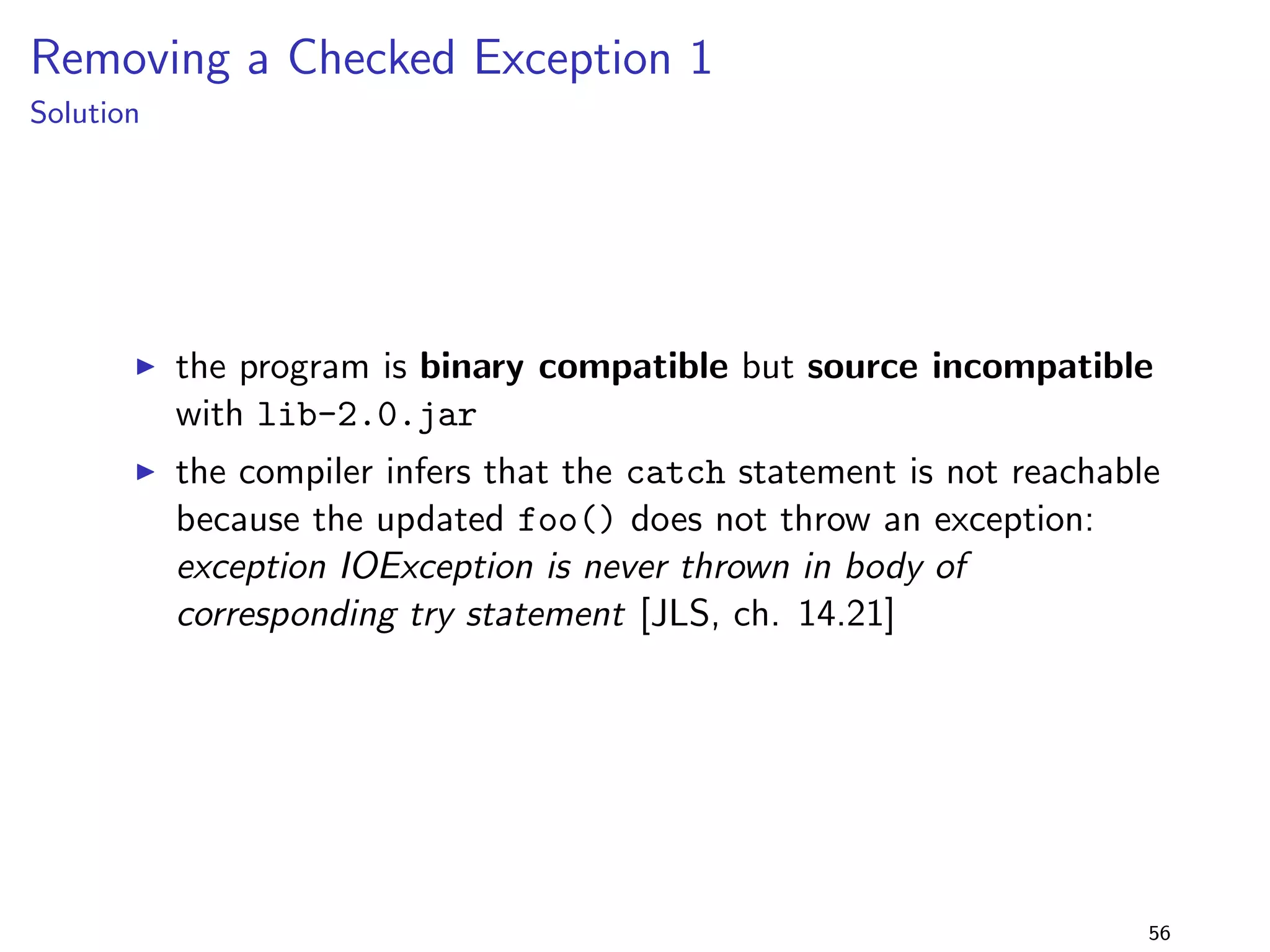
![Primitive vs Wrapper Types 2
Solution
I running the program with library version 2.0 fails !
I the descriptors have dierent types, resulting in a linkage error
(NoSuchFieldError)
I recompiling (and then running) the program with
lib-2.0.jar succeeds - the compiler applies boxing [JLS,
5.1.7]
I i.e., the program is binary incompatible but source
compatible with lib-2.0.jar
41](https://image.slidesharecdn.com/presentation-140123192247-phpapp02/75/Java-Library-Evolution-Puzzlers-57-2048.jpg)
![Generics 1
lib-1.0.jar
package lib.generics1;
import java.util.;
public class Foo f
public static ListString getList() f
ListString list = new ArrayListString();
list.add(42);
return list;
g
g
+
lib-2.0.jar
package lib.generics1;
import java.util.;
public class Foo f
public static ListInteger getList() f
ListInteger list = new ArrayListInteger();
list.add(42);
return list;
g
g
program
package generics1;
import lib.generics1.;
public class Main f
public static void main(String[] args) f
java.util.ListString list = Foo.getList();
System.out.println(list.size());
g
g
I generic type parameter in
method return type is
changed
I does this matter?
42](https://image.slidesharecdn.com/presentation-140123192247-phpapp02/75/Java-Library-Evolution-Puzzlers-58-2048.jpg)
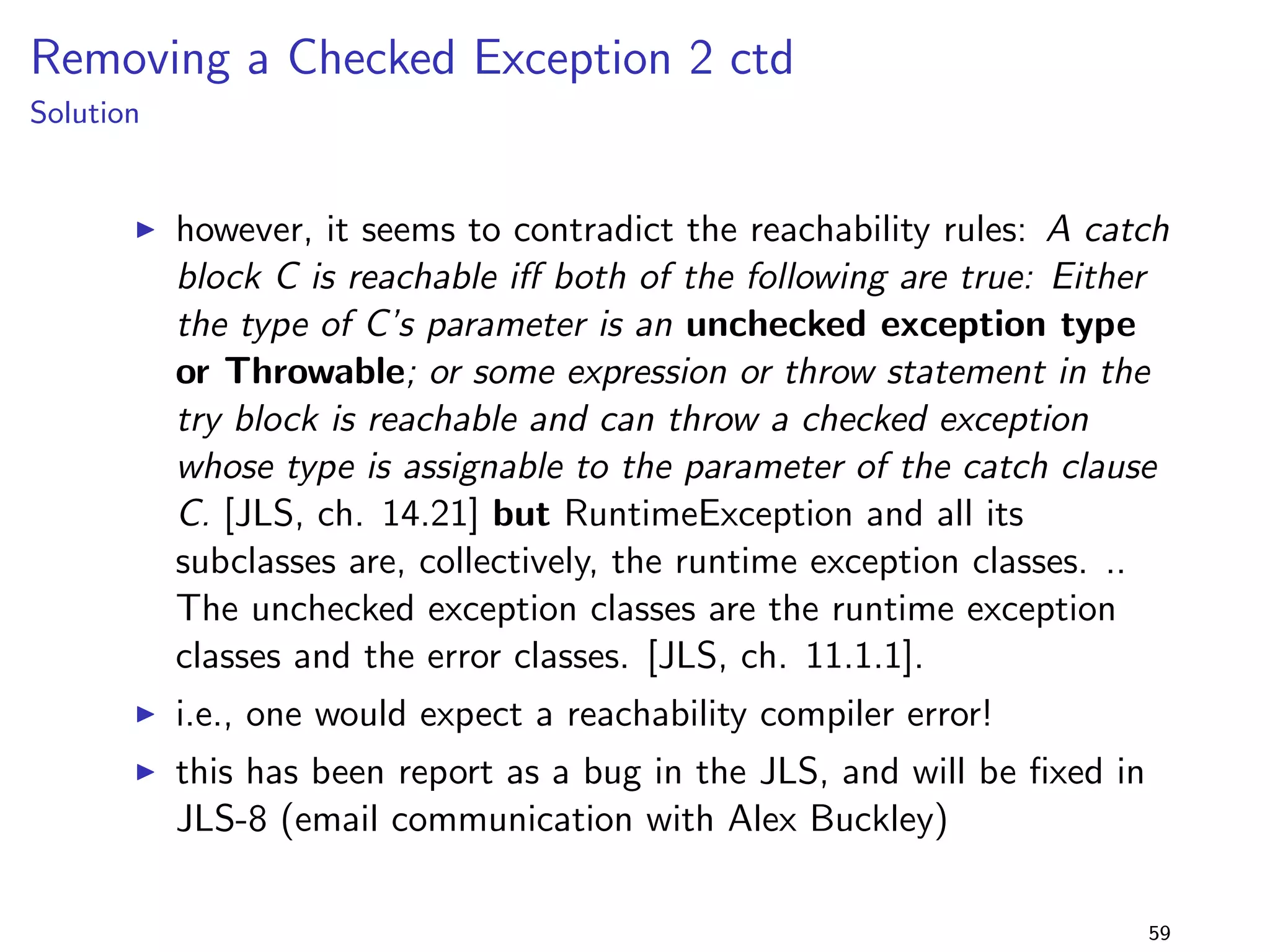
![Generics 2
lib-1.0.jar
package lib.generics2;
import java.util.;
public class Foo f
public static ListString getList() f
ListString list = new ArrayListString();
list.add(42);
return list;
g
g
+
lib-2.0.jar
package lib.generics2;
import java.util.;
public class Foo f
public static ListInteger getList() f
ListInteger list = new ArrayListInteger();
list.add(42);
return list;
g
g
program
package generics2;
import lib.generics2.;
public class Main f
public static void main(String[] args) f
java.util.ListString list = Foo.getList();
for (String s:list) f
System.out.println(s);
g
g
g
I note that only the way the
generic type is used has
changed
I the program iterates over the
strings in the list
44](https://image.slidesharecdn.com/presentation-140123192247-phpapp02/75/Java-Library-Evolution-Puzzlers-60-2048.jpg)
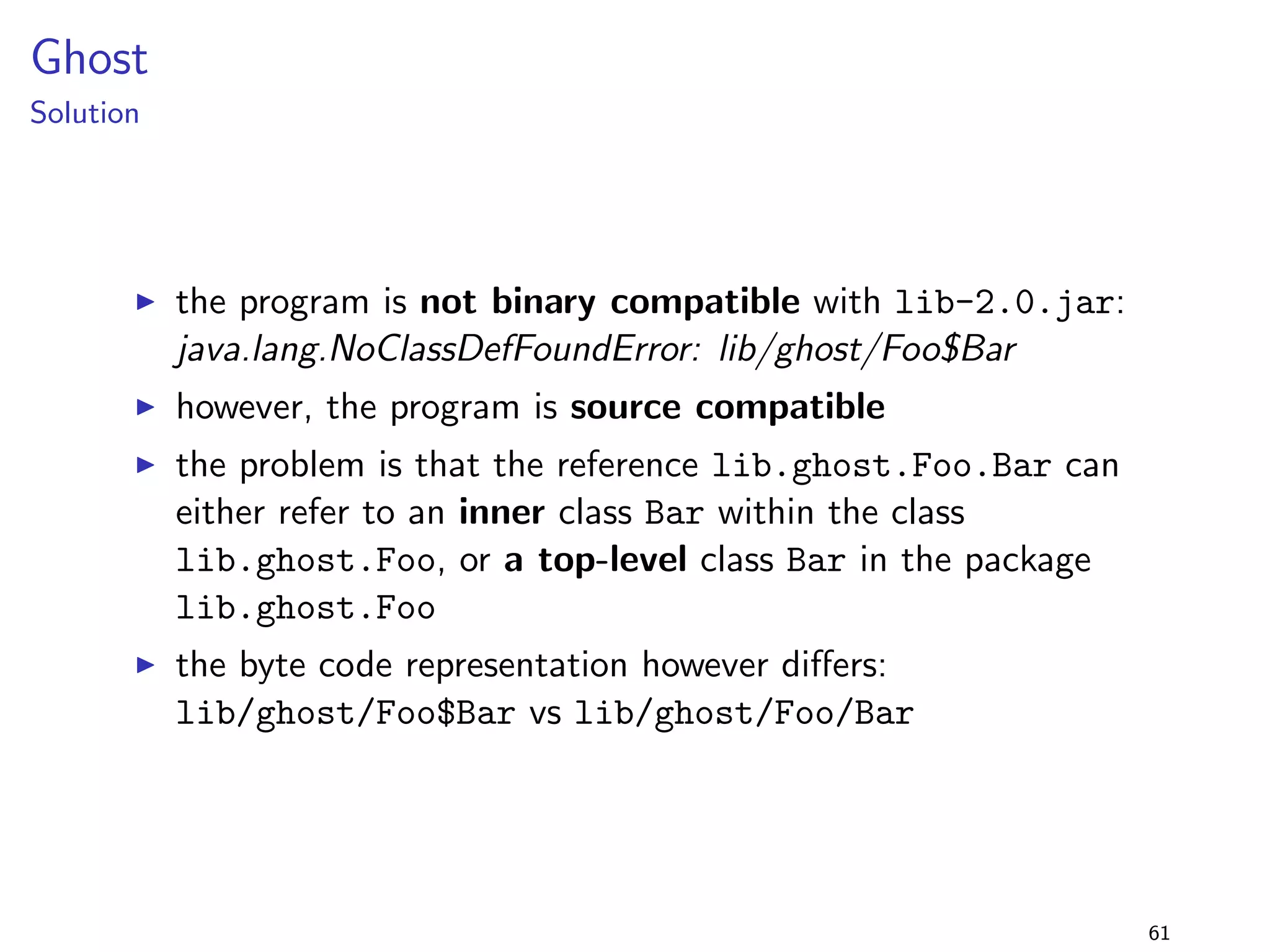
![Generics 3
lib-1.0.jar
package lib.generics3;
import java.io.Serializable;
public class FooT extends Serializable Comparable f
public void foo(T t) f
t.compareTo();
System.out.println(t);
g
g
+
lib-2.0.jar
package lib.generics3;
import java.io.Serializable;
public class FooT extends Comparable Serializablef
public void foo(T t) f
t.compareTo();
System.out.println(t);
g
g
program
package generics3;
import lib.generics3.;
public class Main implements java.io.Serializable f
public static void main(String[] args) f
Main m = new Main();
new Foo().foo(m);
g
g
I Main only implements
Serializable, but not
Comparable
I can Main even be compiled ?
I what is the impact of
changing the order of the
interfaces de](https://image.slidesharecdn.com/presentation-140123192247-phpapp02/75/Java-Library-Evolution-Puzzlers-62-2048.jpg)
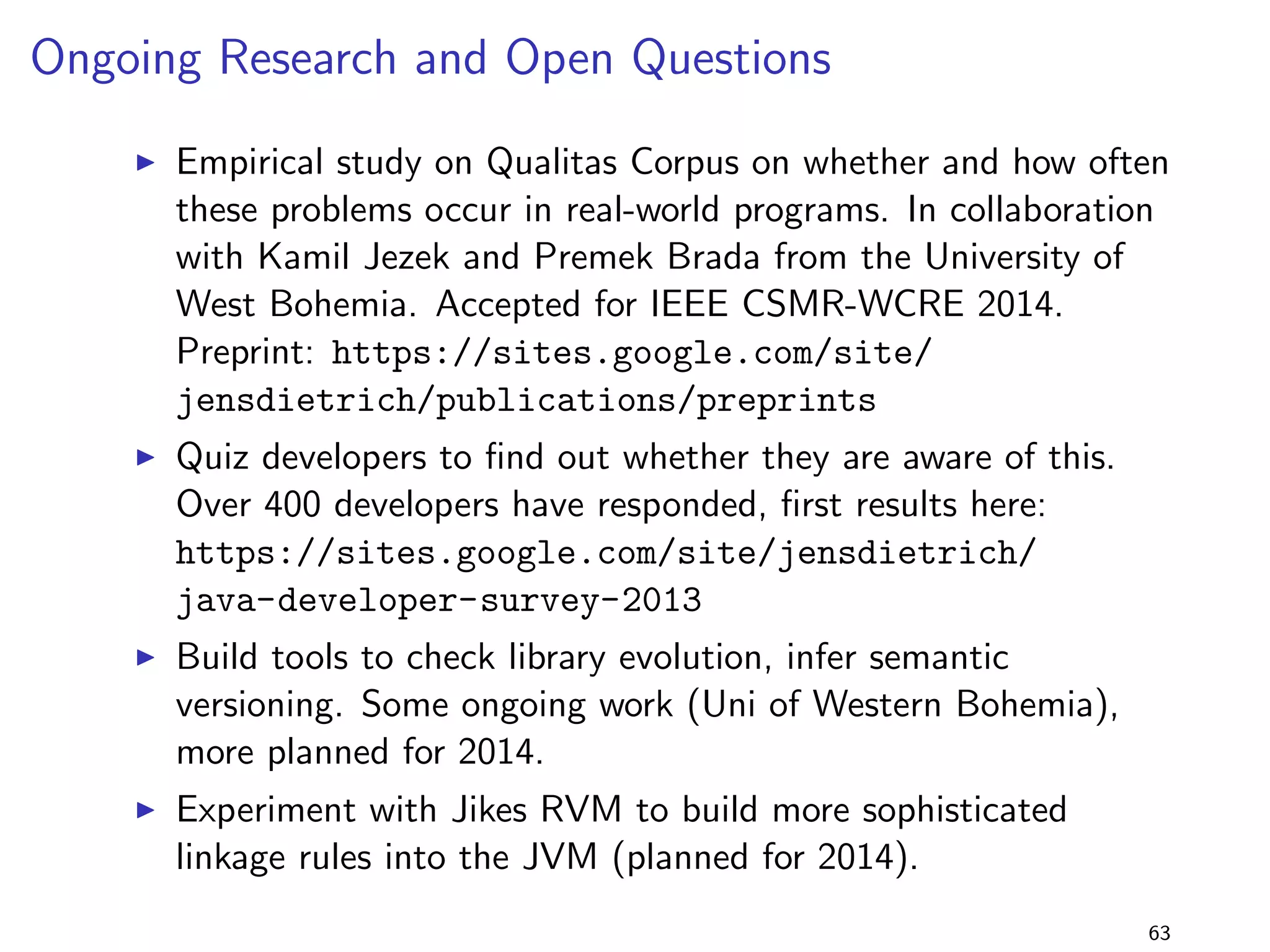
![Generics 3
Solution
I the program compiles and links with lib-1.0.jar, despite
not implementing both interfaces!
I however, executing the program with lib-1.0.jar leads to a
ClassCastException
I the reason for this is how erasure works: only the leftmost
bound is used [JLS, ch. 4.6]
I i.e., foo(T) is referenced as foo(Serializable)
I before compareTo is invoked (at runtime!), the parameter is
cast to Comparable, and this fails
47](https://image.slidesharecdn.com/presentation-140123192247-phpapp02/75/Java-Library-Evolution-Puzzlers-64-2048.jpg)
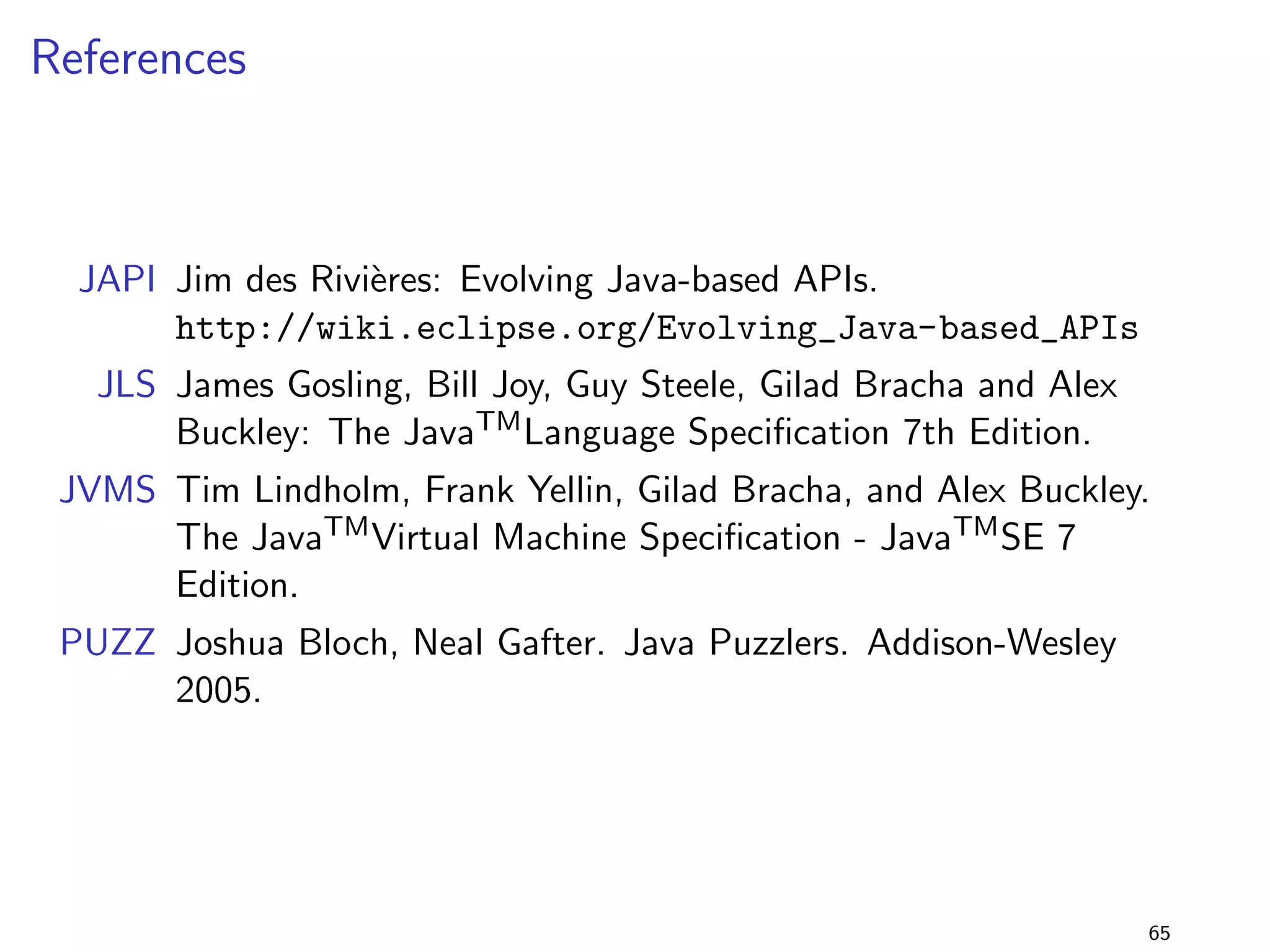


![nal int MAGIC = 43;
g
program
package constants1;
import lib.constants1.;
public class Main f
public static void main(String[] args) f
System.out.println(Foo.MAGIC);
g
g
I now the question is: what
does this program print?
49](https://image.slidesharecdn.com/presentation-140123192247-phpapp02/75/Java-Library-Evolution-Puzzlers-68-2048.jpg)



![nal String MAGIC = 43;
g
program
package constants2;
import lib.constants2.;
public class Main f
public static void main(String[] args) f
System.out.println(Foo.MAGIC);
g
g
I inlining is applied to
primitive data types, but
what about strings?
I what will be printed to the
console?
51](https://image.slidesharecdn.com/presentation-140123192247-phpapp02/75/Java-Library-Evolution-Puzzlers-72-2048.jpg)



![nal int MAGIC = 40+3;
g
program
package constants3;
import lib.constants3.;
public class Main f
public static void main(String[] args) f
System.out.println(Foo.MAGIC);
g
g
I now the constant value is
de](https://image.slidesharecdn.com/presentation-140123192247-phpapp02/75/Java-Library-Evolution-Puzzlers-76-2048.jpg)

